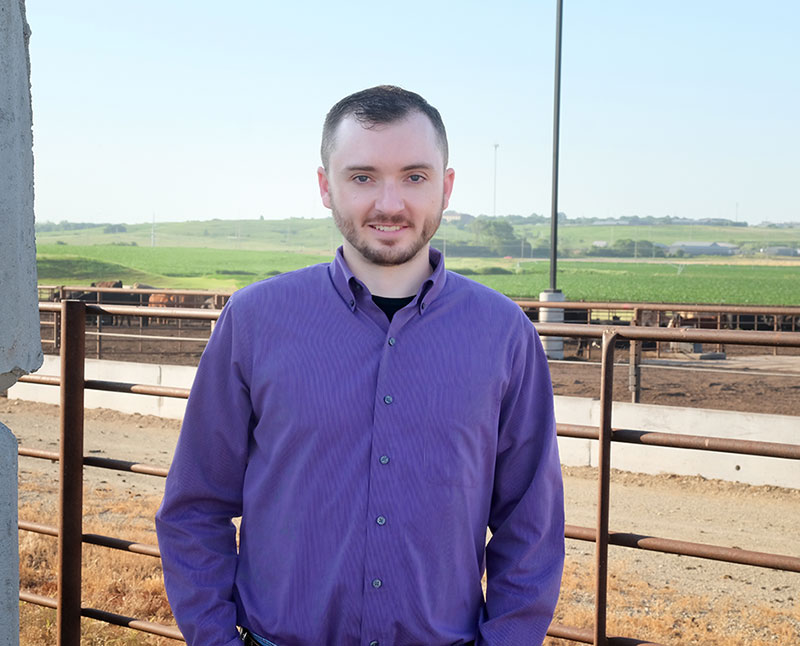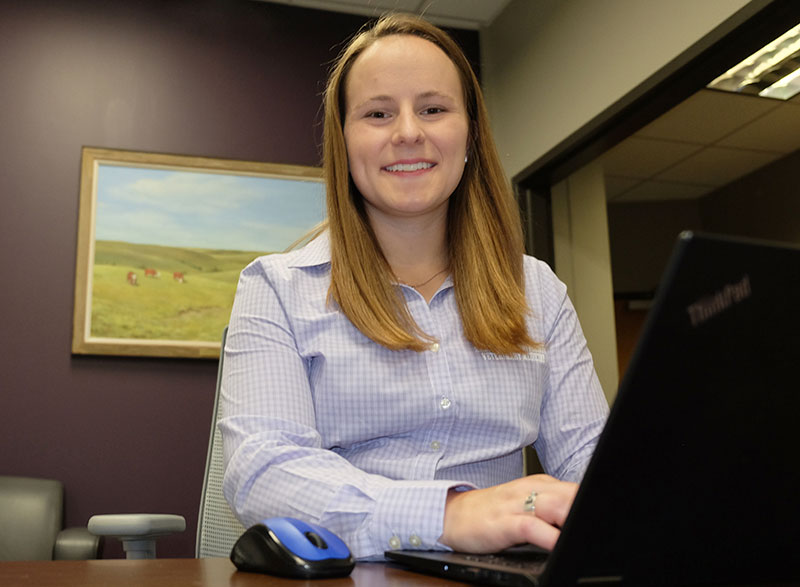Archived News & Events
News/Events
CORE PhD student defends dissertation
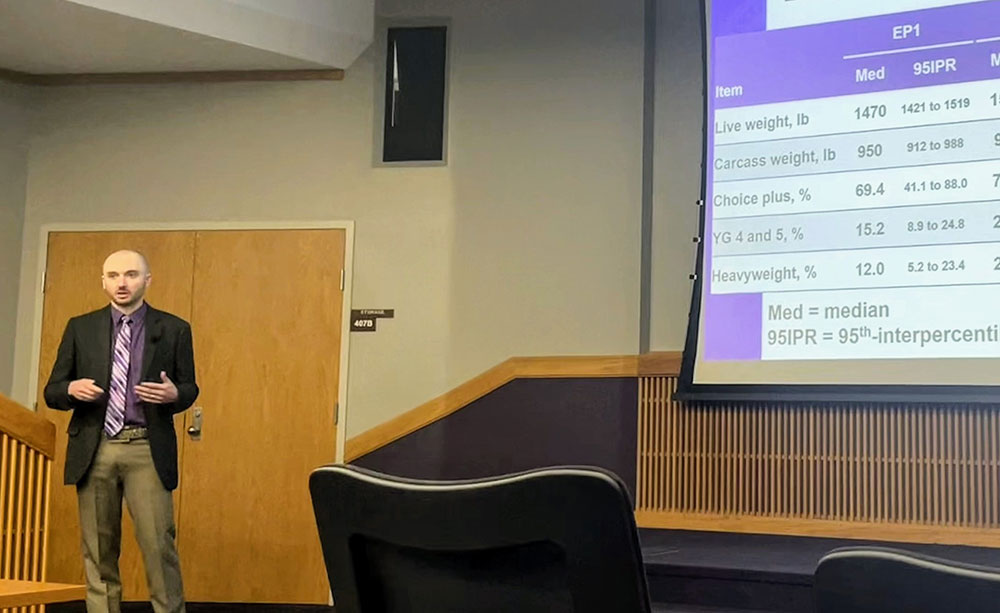
Lucas Horton presented his PhD defense titled "Evaluations of Extended Finishing in Feedlot Cattle and Frameworks for Economic Assessments of Controlled Trials" on November 1, 2024, and he successfully defended his dissertation. Congratulations, Lucas!
Seminars – Dr. Randall Singer
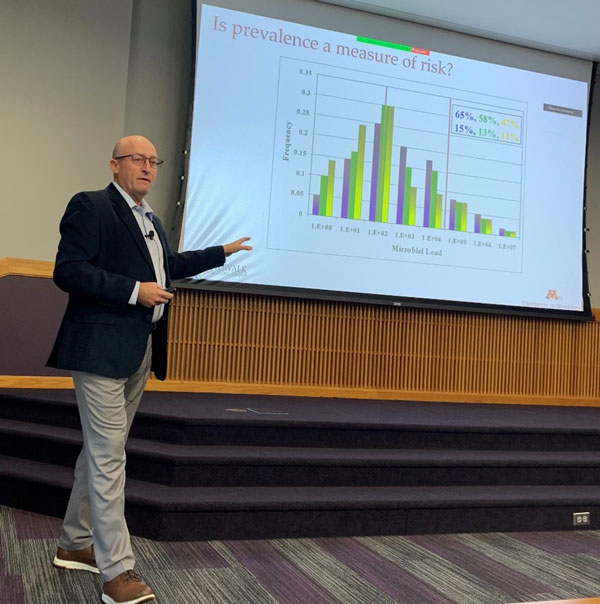
The Center for Outcomes Research and Epidemiology (CORE), along with the Departments of Diagnostic Medicine and Pathobiology and Anatomy and Physiology at the College of Veterinary Medicine, Kansas State University, hosted Dr. Randall Singer, Professor of Epidemiology at the University of Minnesota's College of Veterinary Medicine. Dr. Singer delivered two insightful presentations: 'Antimicrobial Use in Poultry Production and Its Relationship to Antimicrobial Resistance' on October 15, 2024, and 'Controlling Salmonella in Poultry Production: Challenges and Misperceptions' on October 17, 2024.
2024 USAHA and AAVLD Annual Meeting
Torre Dunlea (left) and MaRyka Smith (right), PhD students advised by Dr. Michael Sanderson, both presented at the 2024 United States Animal Health Association (USAHA) and American Association of Veterinary Laboratory Diagnosticians (AAVLD) annual meeting in Nashville, Tennessee.
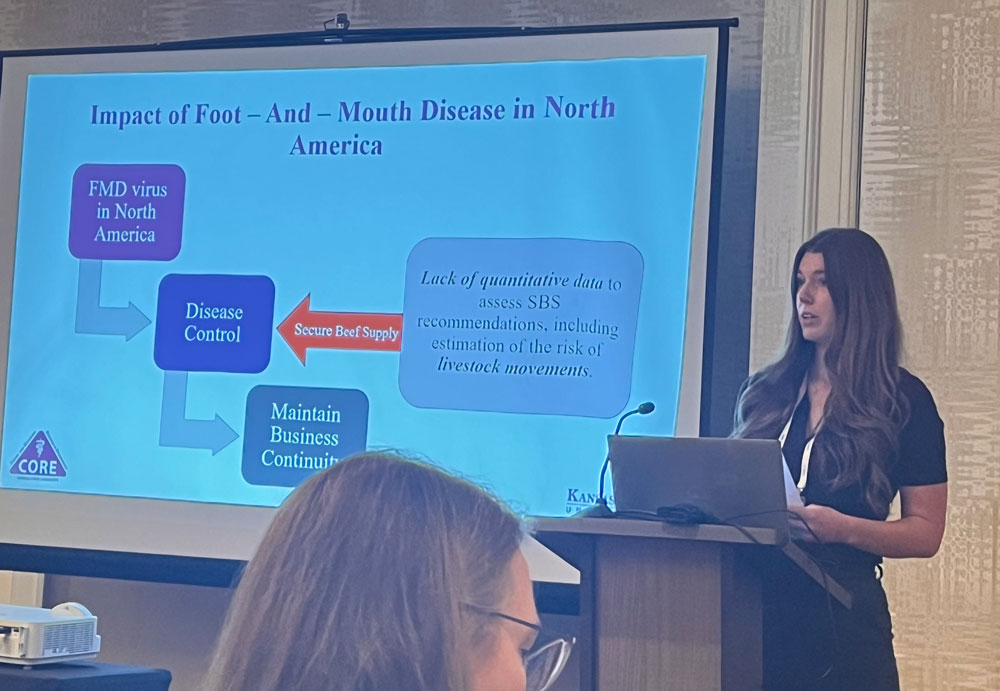
Torre’s presentation was “A quantitative model of the risk of FMD transmission following cattle movements during an outbreak.”
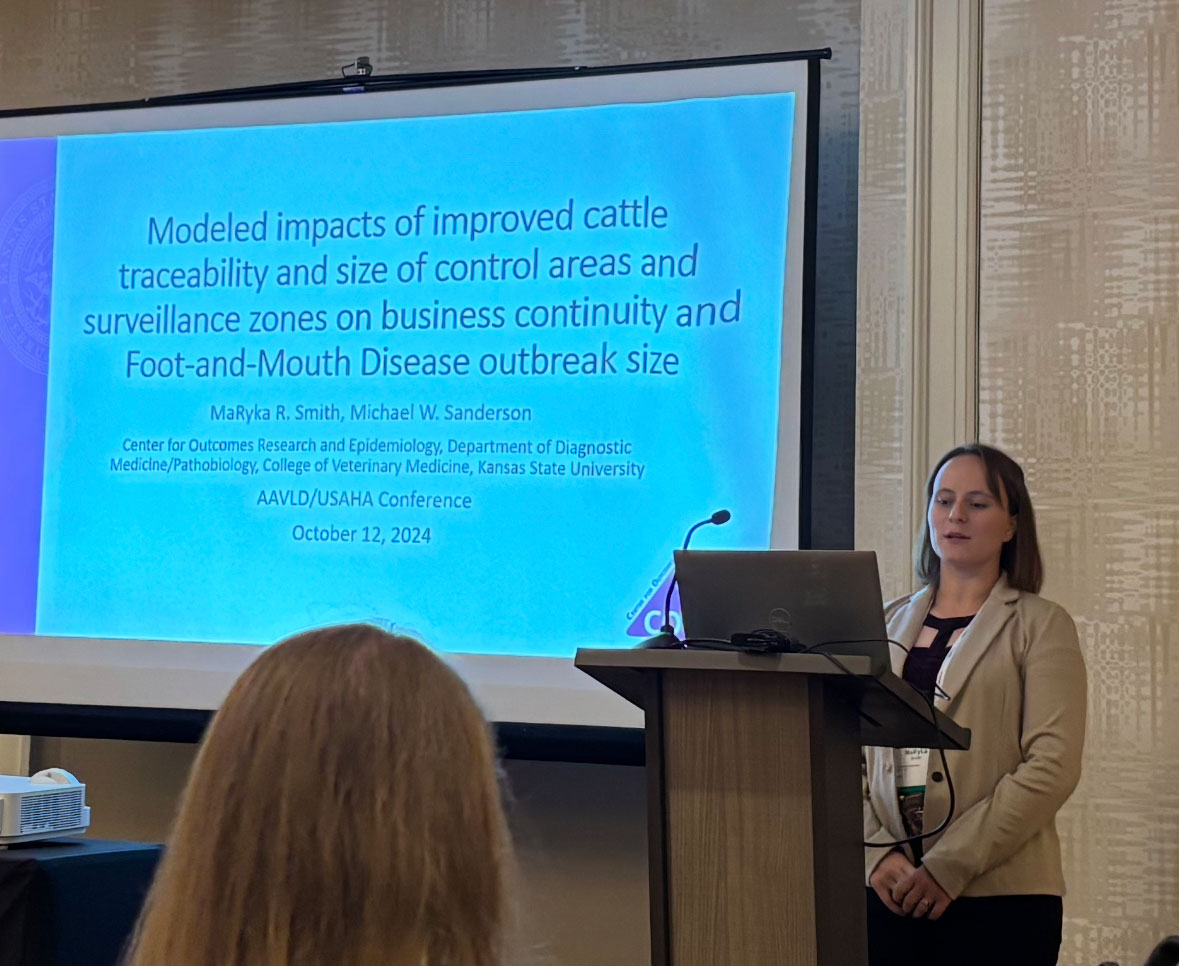
MaRyka presented “Modeled impacts of improved cattle traceability and size of control areas and surveillance zones on business continuity and Foot-and-Mouth Disease outbreak size.”
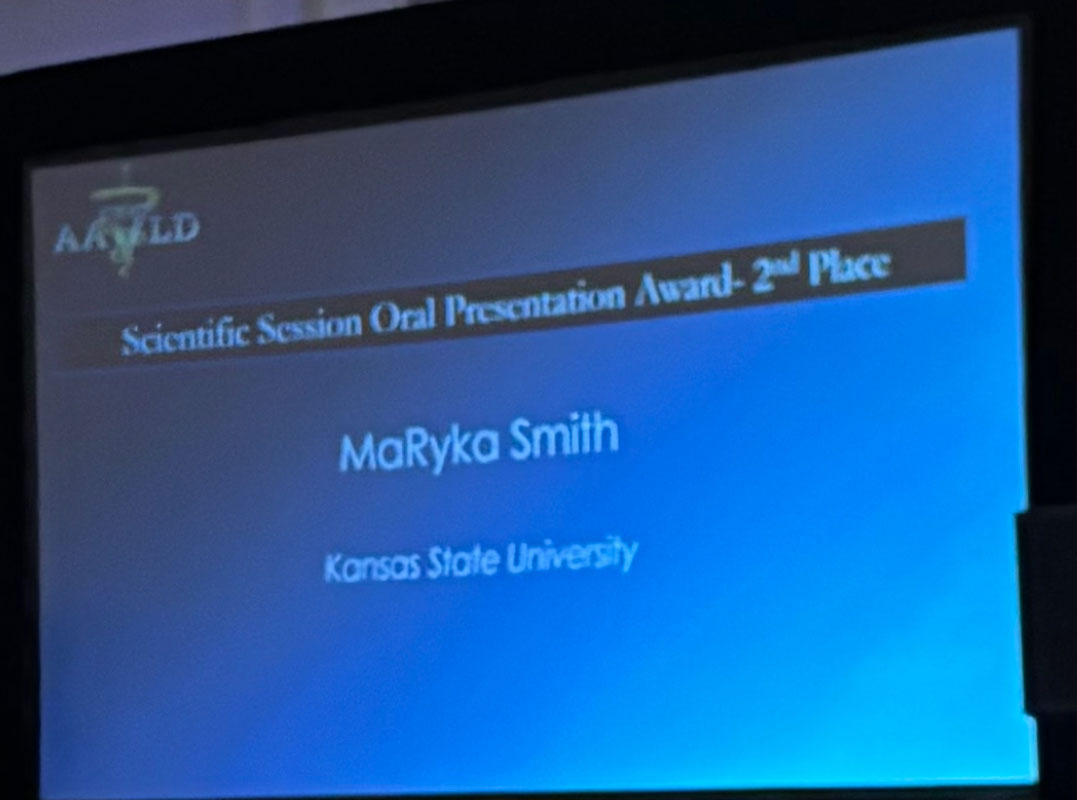
MaRyka was awarded 2nd place for her scientific session oral presentation.
2024 VRSP Student
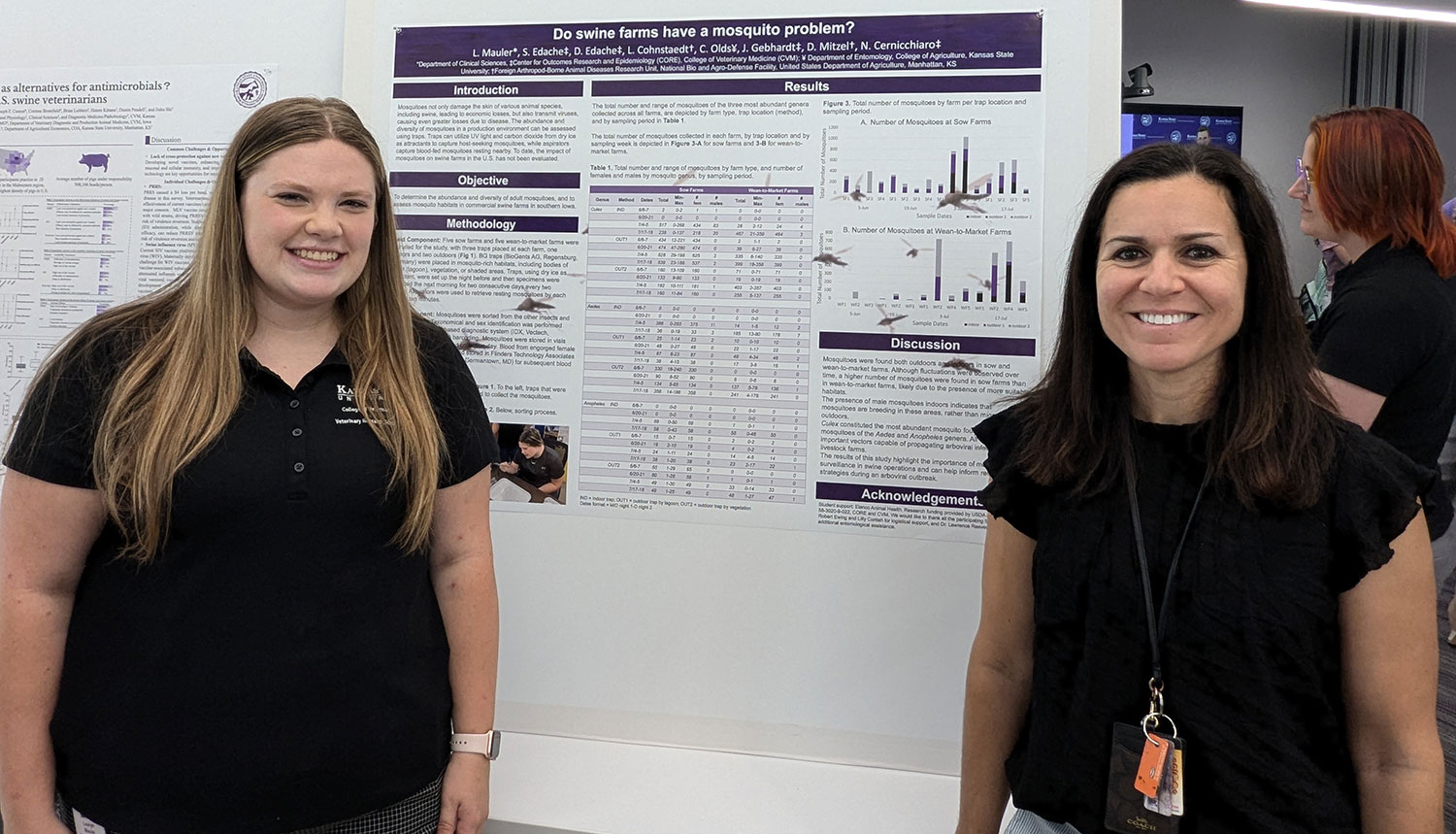
Lauryn Mauler and Dr. Natalia Cernicchiaro at the K-State VRSP poster session
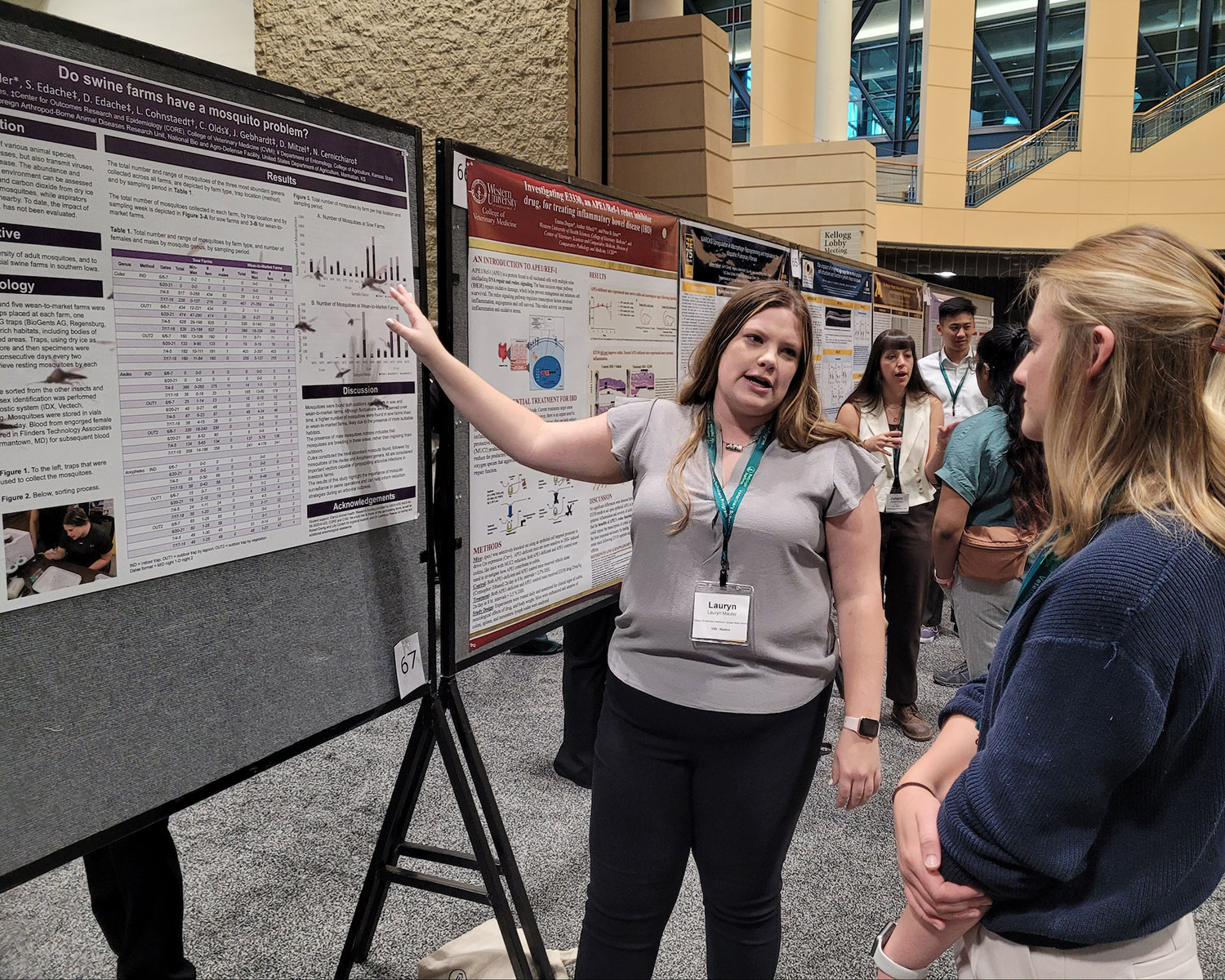
Lauryn Mauler presenting her poster at the 2024 National Veterinary Scholars Symposium
This summer, CORE hosted one veterinary student participating in the Veterinary Research Scholars Program (VRSP). This 3-month research program allows students to work with a faculty mentor on a summer research project. Lauryn Mauler, worked with Dr. Natalia Cernicchiaro, Associate Director of Research for CORE, on the project, “Do swine farms have a mosquito problem? Assessing mosquito vectors in U.S. commercial swine operations”. During the program, she had the opportunity to learn mosquito collection techniques, and she traveled and collected mosquitoes at different pig farms in Iowa. Lauryn presented her work at the 2024 National Veterinary Scholars Symposium (August 8-11, 2024) in St. Paul, Minnesota.
2024 Bovine Respiratory Disease Symposium and Academy of Veterinary Consultants Summer Meeting
CORE faculty and students attended the Bovine Respiratory Disease Symposium (BRDS) August 7-8, and the Academy of Veterinary Consultants (AVC) Summer meeting, August 8-10 in Denver, Colorado. Taylor McAtee, PhD candidate advised by Dr. David Renter, presented “Treating BRD: Comparing three BRD treatment options in feedlot calves that received tulathromycin metaphylaxis on-arrival" hosted by Merck Animal Health. Dr. David Renter gave a talk on BRD in the context of the sustainability domains and participated in a panel discussion. Dr. Vanessa Horton, PhD candidate advised by Dr. Natalia Cernicchiaro, presented her poster titled “Understanding bovine respiratory disease (BRD) metaphylaxis practice across U.S. feedlots: a survey of veterinary consultants’ perspectives.” Vanessa won a poster award in the EPSCOR states poster competition.
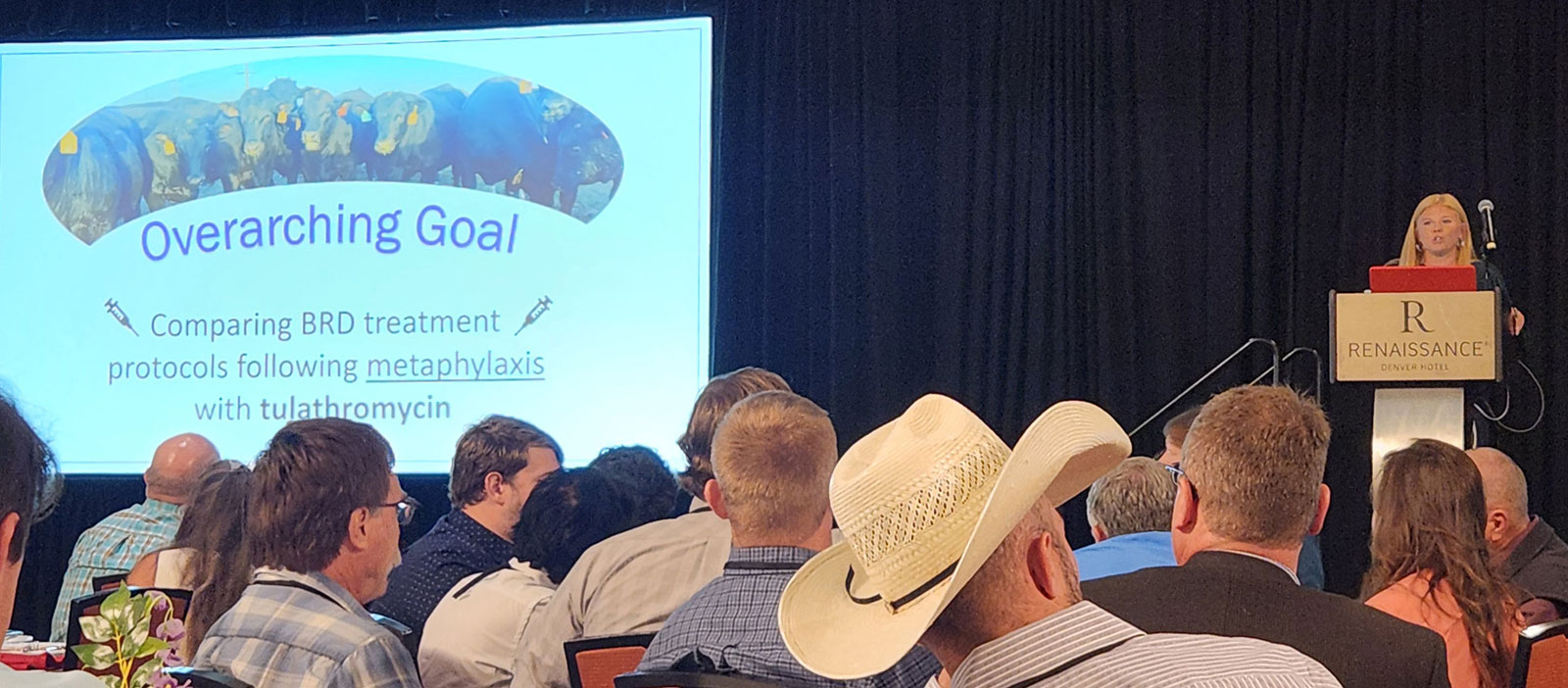 Taylor McAtee presented “Treating BRD: Comparing three BRD treatment options in feedlot calves that received tulathromycin metaphylaxis on-arrival"
Taylor McAtee presented “Treating BRD: Comparing three BRD treatment options in feedlot calves that received tulathromycin metaphylaxis on-arrival"
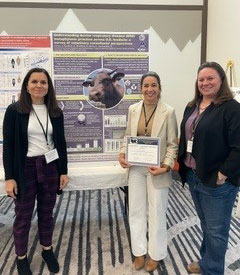
In the picture with Vanessa from left to right - Drs. Natalia Cernicchiaro, Vanessa Horton, and Christy Hanthorn)
Both Taylor and Vanessa gave oral presentations at the AVC meeting. Taylor presented "Quantifying associations between cattle health and performance metrics with estimated greenhouse gas emissions in U.S. feedlots." Vanessa presented "Fostering antimicrobial stewardship: a survey of veterinary perspectives on bovine respiratory disease risk and metaphylaxis use in U.S. feedlots.”
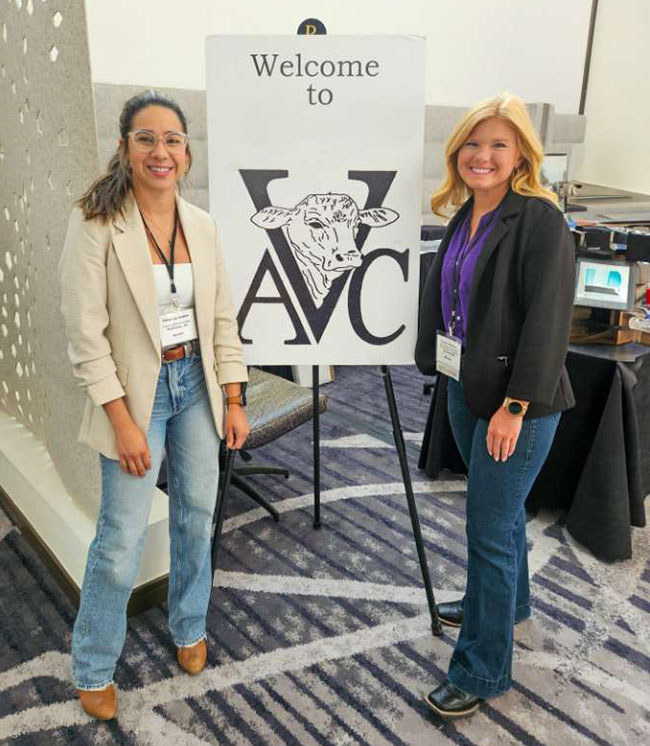 Vanessa and Taylor at the AVC
Vanessa and Taylor at the AVC
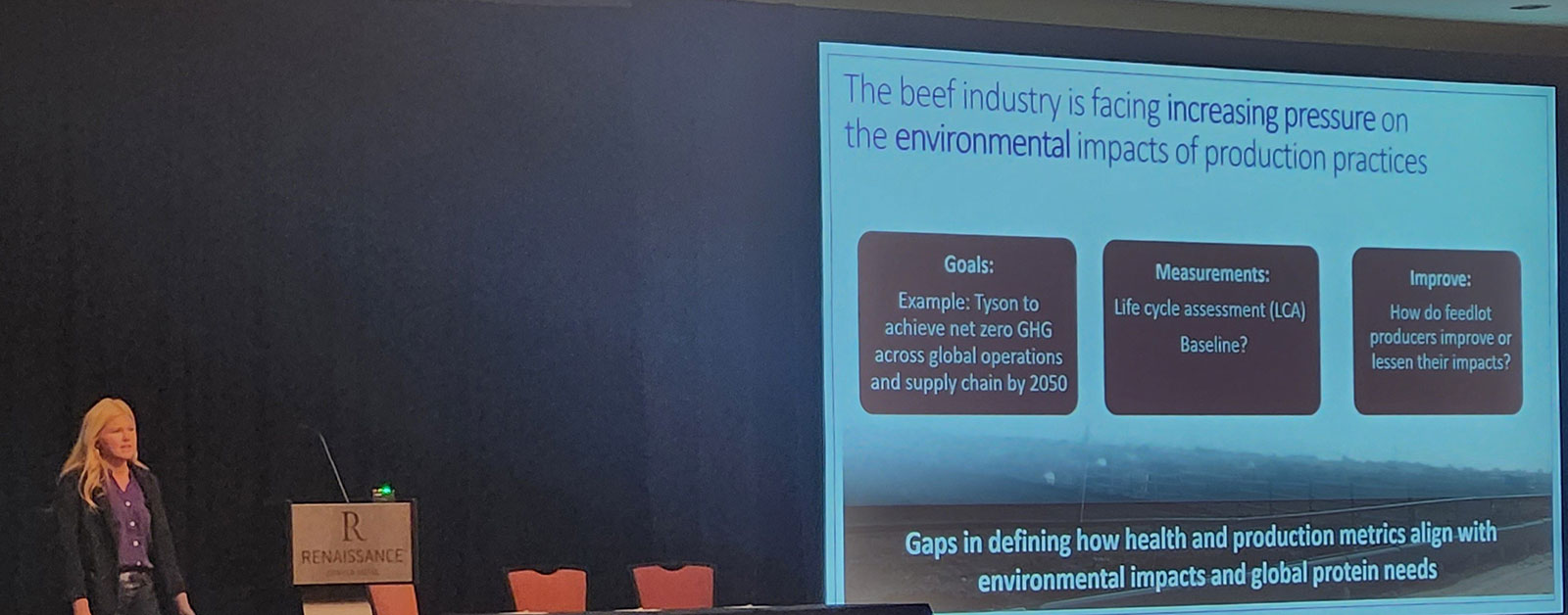
Taylor presenting at AVC
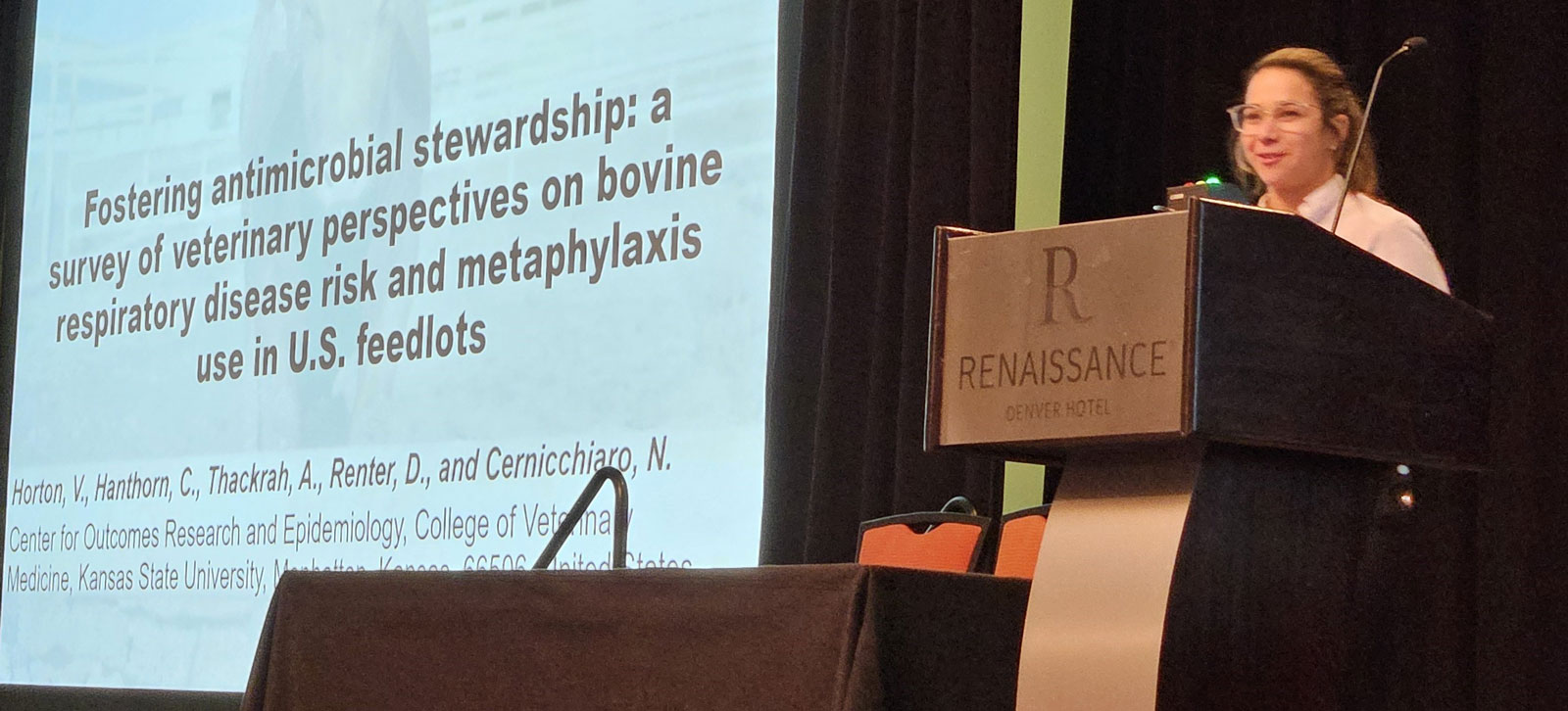
Vanessa presenting at AVC
2024 Plains Nutrition Council Spring Conference
Taylor McAtee, PhD student with Dr. Renter, attended the 2024 Plains Nutrition Council Spring Conference in San Antonio, Texas, April 10-12, 2024. She presented her poster titled "Growth performance, carcass characteristics, health, and mobility scores of finishing steers fed Experior (Lubabegron) or Optaflexx (Ractopamine Hydrochloride), and she won an award in the highly competitive poster competition.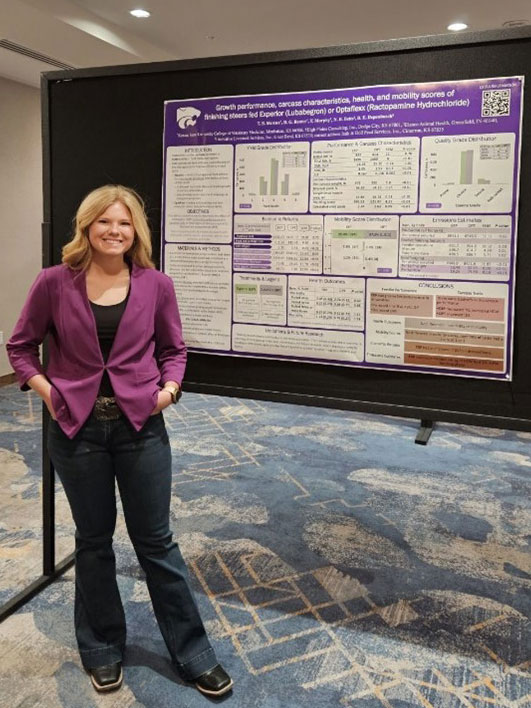
Beef Industry Safety Summit 2024
Dr. Stephen Edache, doctoral student under Dr. Natalia Cernicchiaro’s supervision, was the recipient of a 2024 Beef Industry Food Safety Council (BIFSCo) travel scholarship and presented his MS thesis work entitled “Evaluation of a postbiotic on Salmonella enterica prevalence, serotype diversity, and antimicrobial resistance in subiliac lymph nodes of cull dairy” in Denver, Colorado.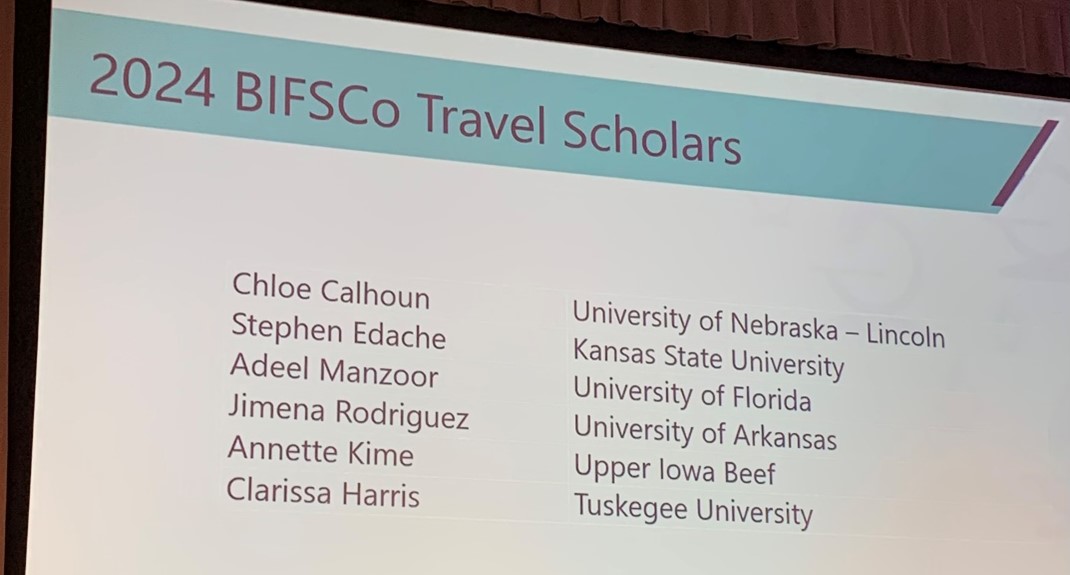
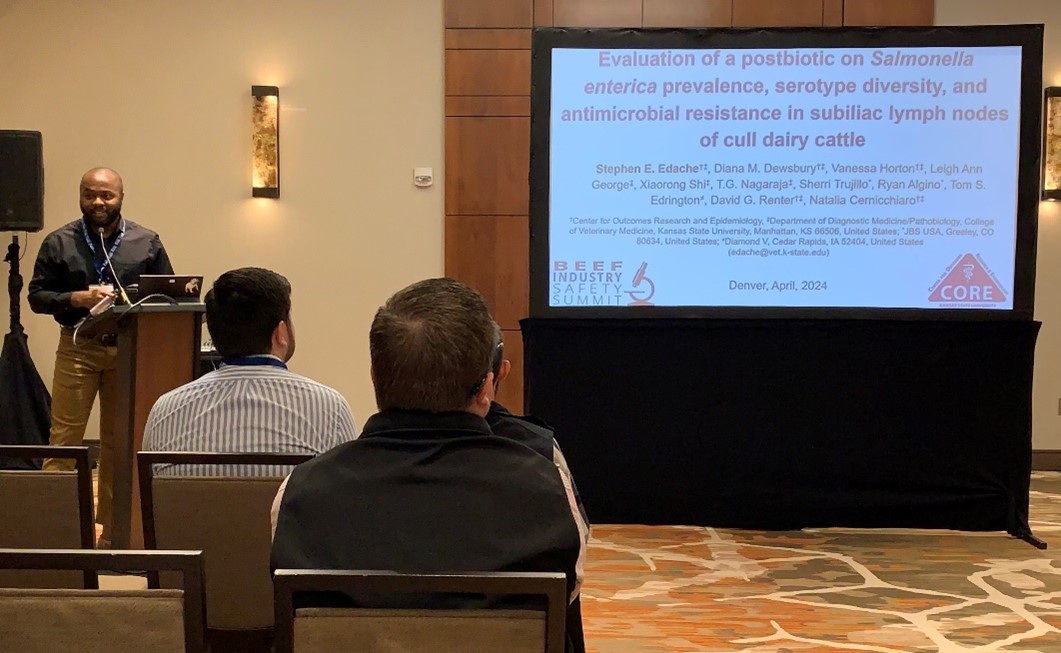
Dr. Brandon Depenbusch, Vice-President of cattle feeding at Irsik & Doll Feed Services, Inc., and a member of CORE’s Advisory Council, represented the cattle feeding industry as a panelist, addressing the topic “Challenges Across the Beef Supply Chain” at the BIFSCo meeting 2024.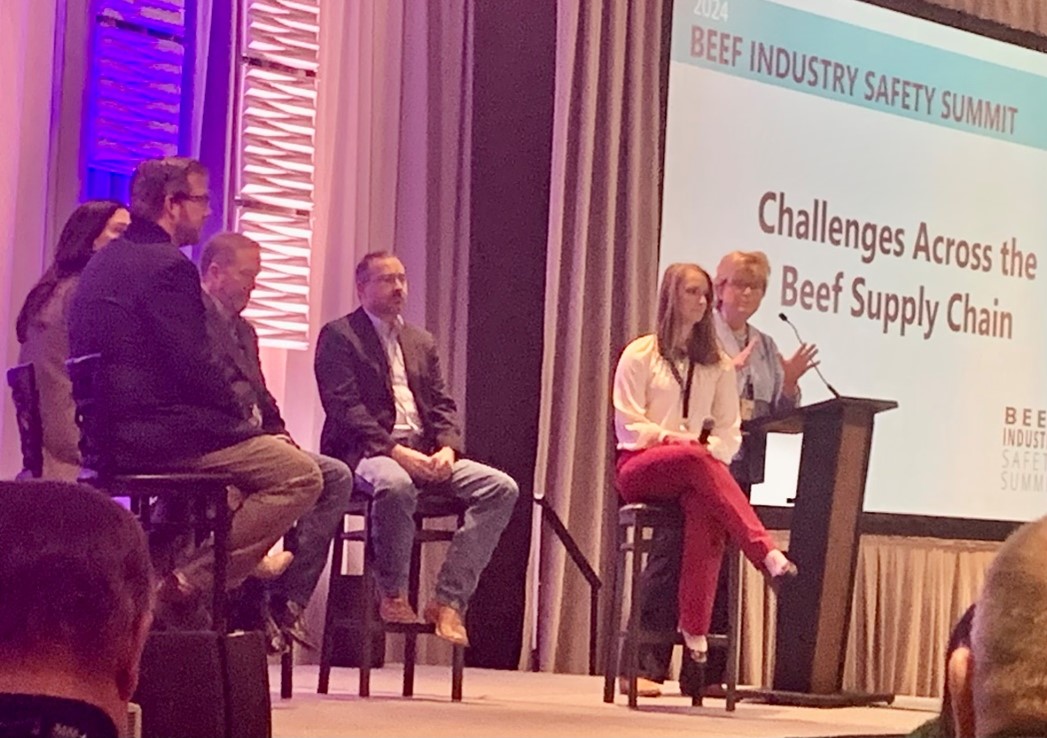
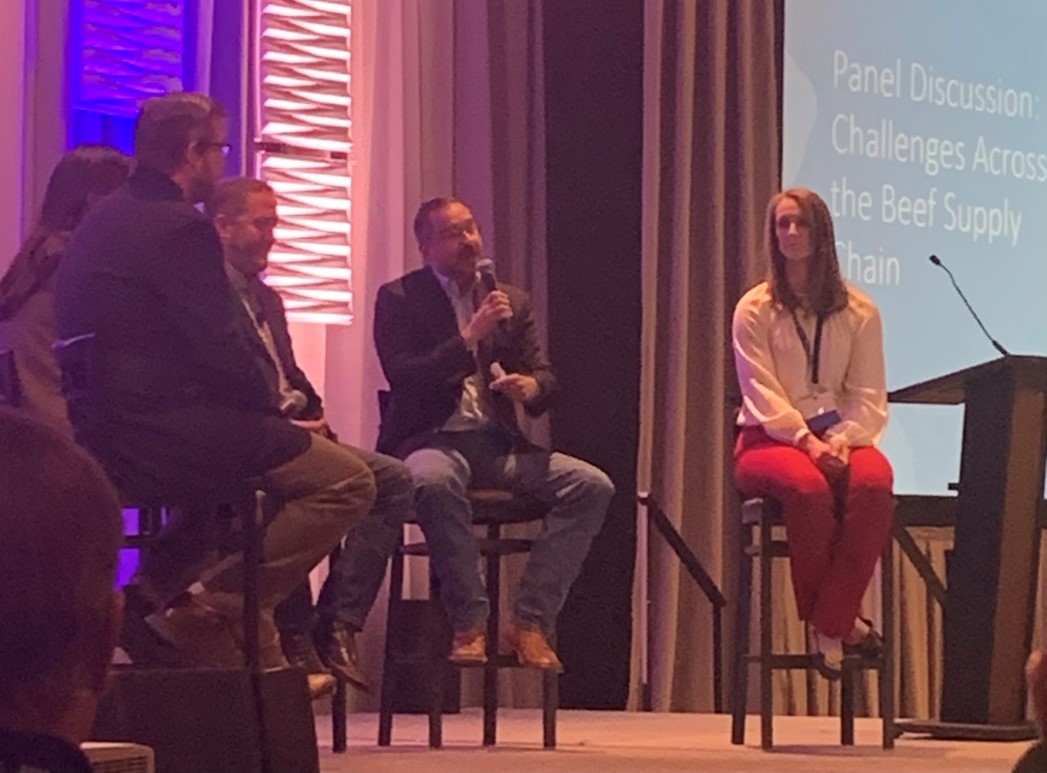
Phi Zeta Research Day 2024
Phi Zeta Research Day 2024 took place on March 5, 2024, and CORE students participated in the event. Stephen Edache, Vanessa Horton, and Taylor McAtee, PhD students for CORE, presented oral presentations. Stephen’s presentation was titled “Assessing the impact of a postbiotic on Salmonella enterica prevalence, serotype diversity, and antimicrobial resistance in subiliac lymph nodes of cull dairy cattle.” Vanessa’s presentation was titled, “Japanese encephalitis virus transmission in swine populations: A rapid systematic review of the literature.”
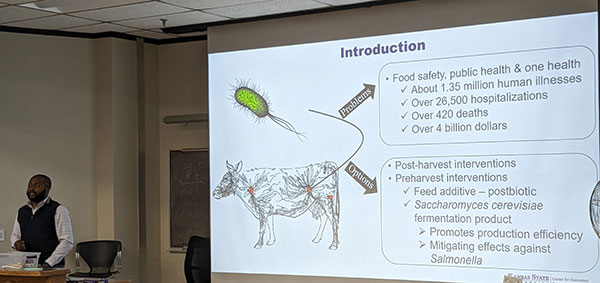
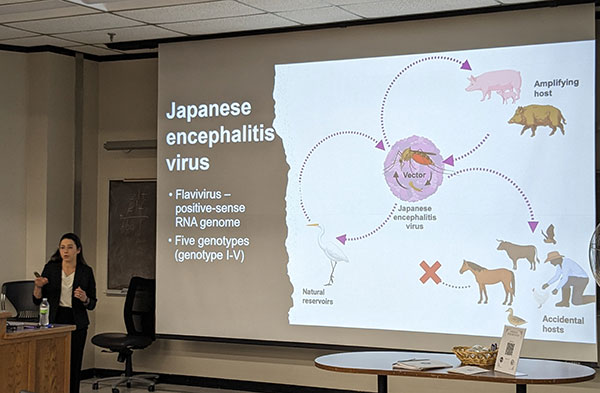
Taylor’s presentation was titled “Quantifying associations between cattle health and performance metrics with estimated greenhouse gas emissions in U.S. feedlots.” Deanna Gennett, third-year veterinary student, gave a poster presentation titled “Evaluating estimated carbon emissions and feedlot production data to address beef sustainability.”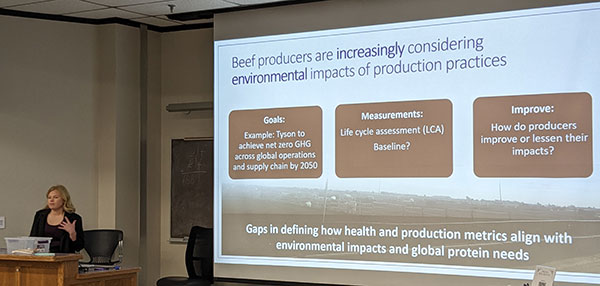
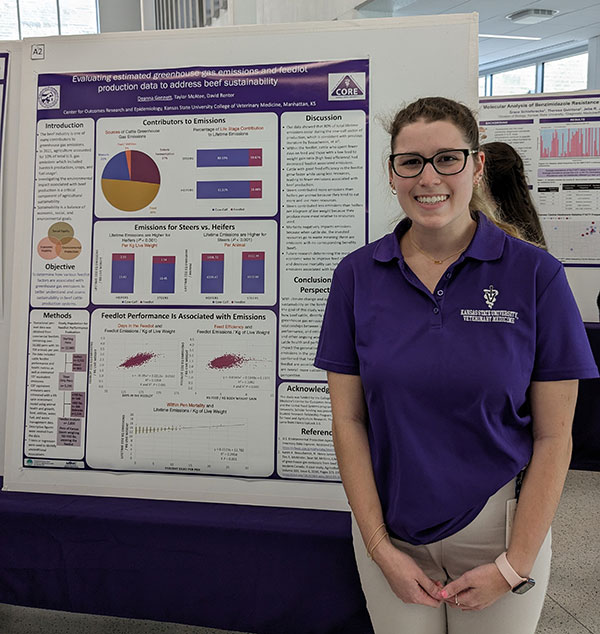
Taylor McAtee was awarded 1st place for the Applied/Clinical Science Oral Presentations (Large Animal) category. MaRyka Smith, fourth year veterinary student, was selected as a Student Initiate of Phi Zeta, as she is in the top 25% of her class. Deanna Gennett, third year veterinary student, was selected as a Student Initiate of Phi Zeta, as she is in the top 10% of her class. Vanessa Horton, graduate veterinarian and PhD student, was inducted into Phi Zeta, as she has displayed ability of a high order in veterinary medicine. 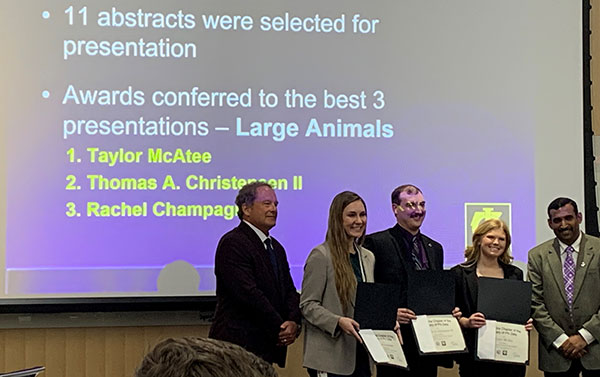
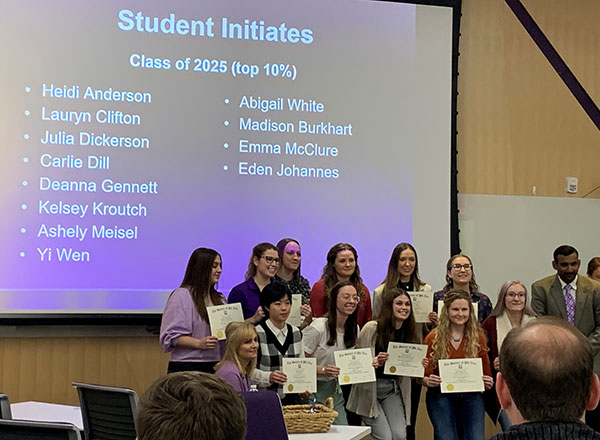
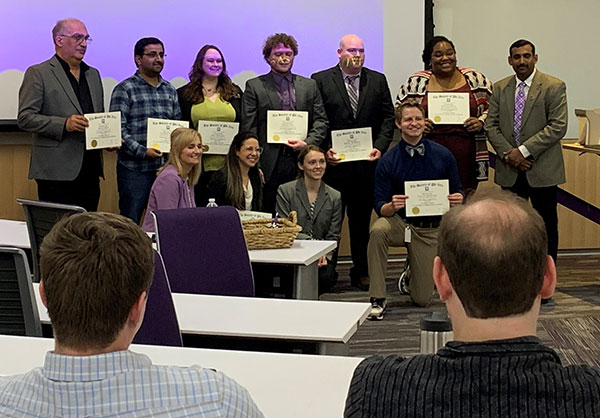
Cattleman's Day 2024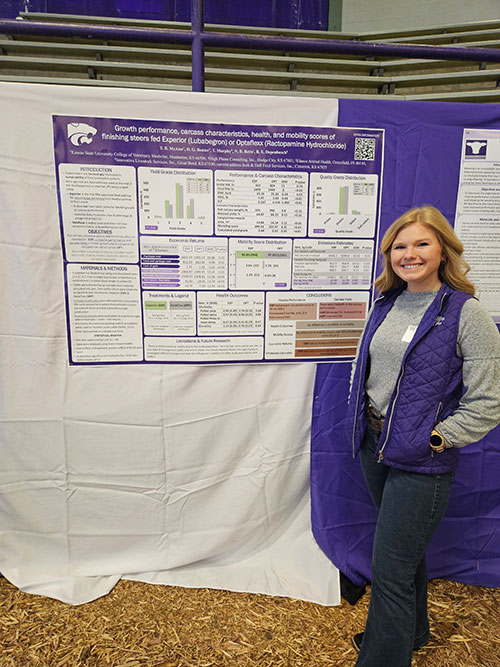
Taylor McAtee, PhD student for CORE, presented on Friday, March 1, 2024, at the 111th Cattlemen's Day. Her poster was titled "Growth performance, carcass characteristics, health, and mobility scores of finishing steers fed Experior (Lubabegron) or Optaflexx (Ractopamine Hydrochloride)."
Conference of Research Workers in Animal Diseases 2024
CORE members participated in the Conference of Research Workers in Animal Diseases (CRWAD) 2024 held in Chicago, Illinois. Dr. David Renter, Dr. Mike Sanderson, Lucas Horton, Taylor McAtee, Dr. Vanessa Horton, Dr. Stephen Edache, and Dr. Deana Hardee presented oral presentations, and Dr. David Edache and Deanna Gennett both gave poster presentations.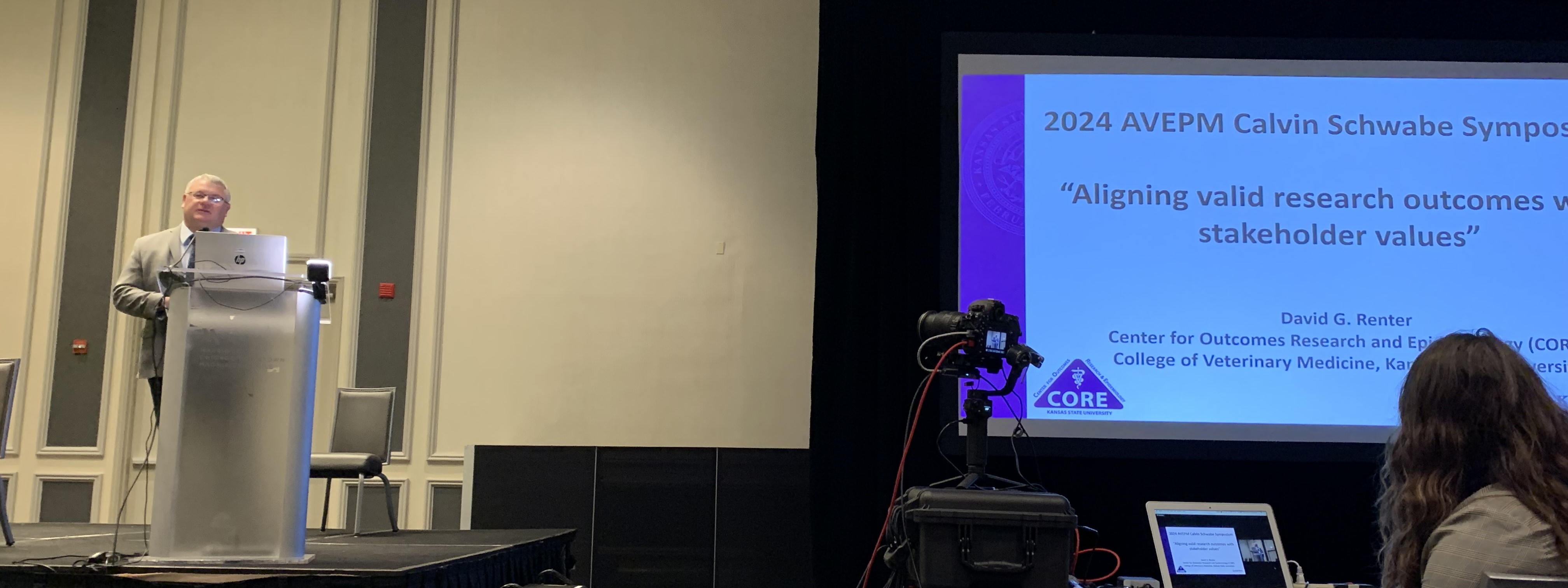
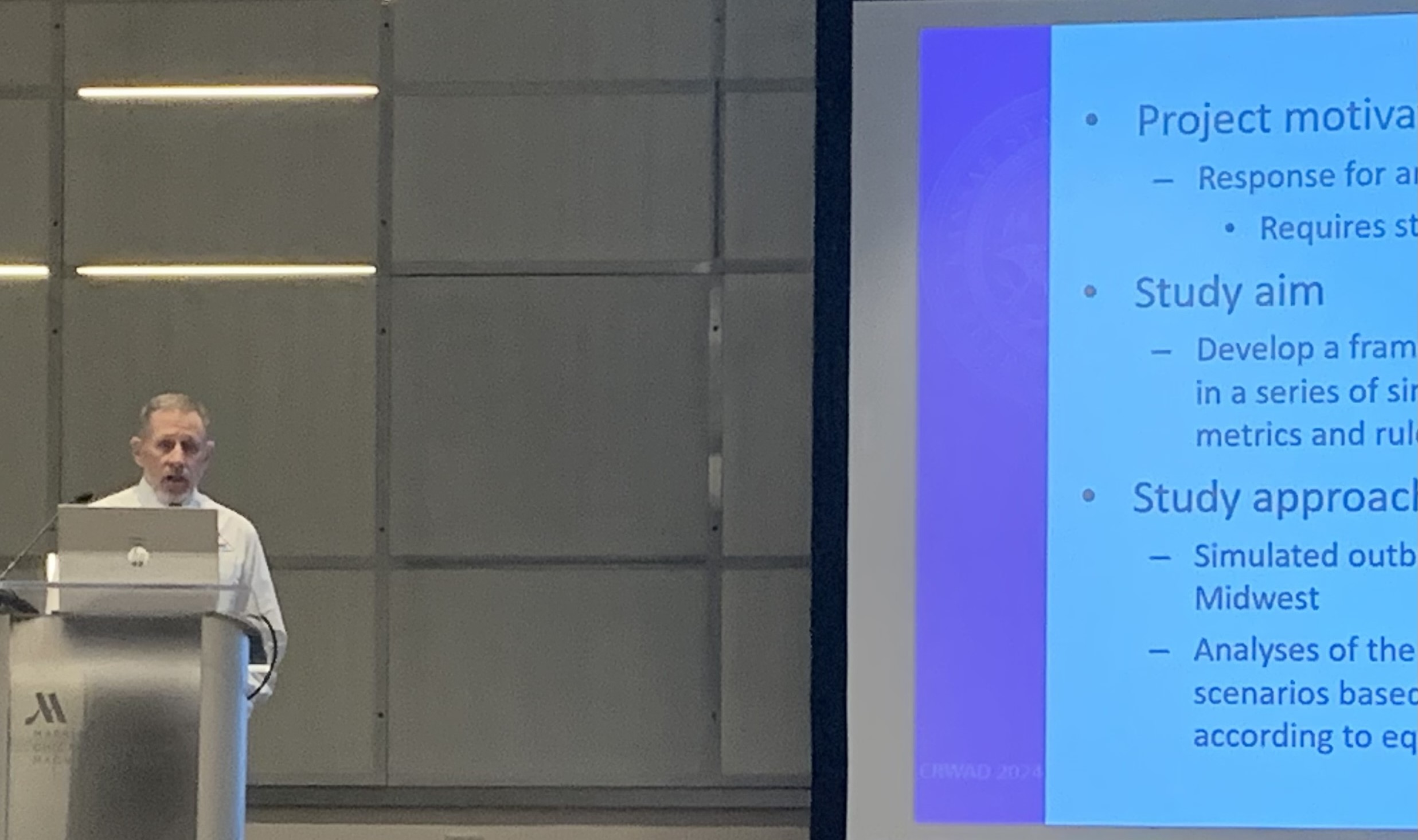
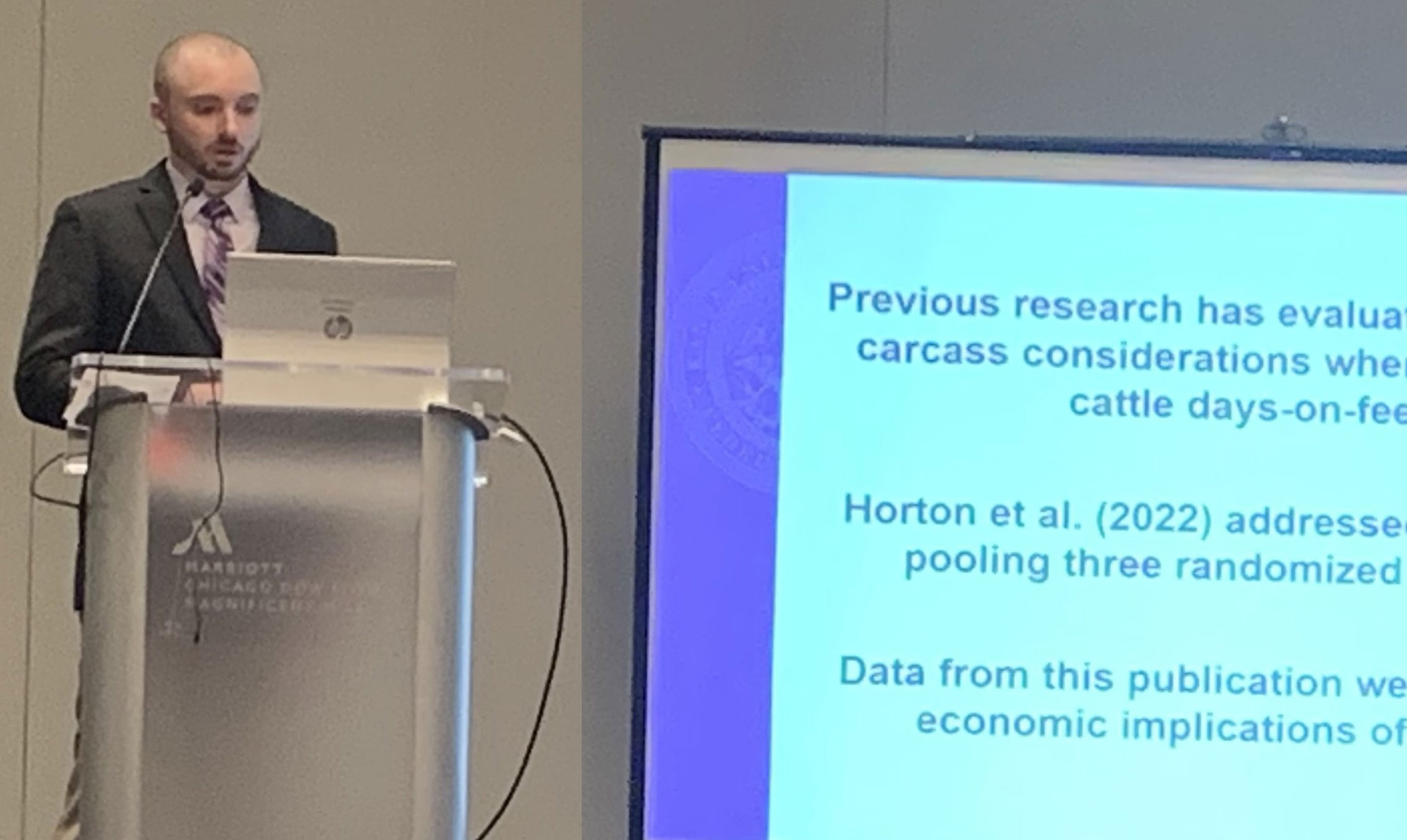
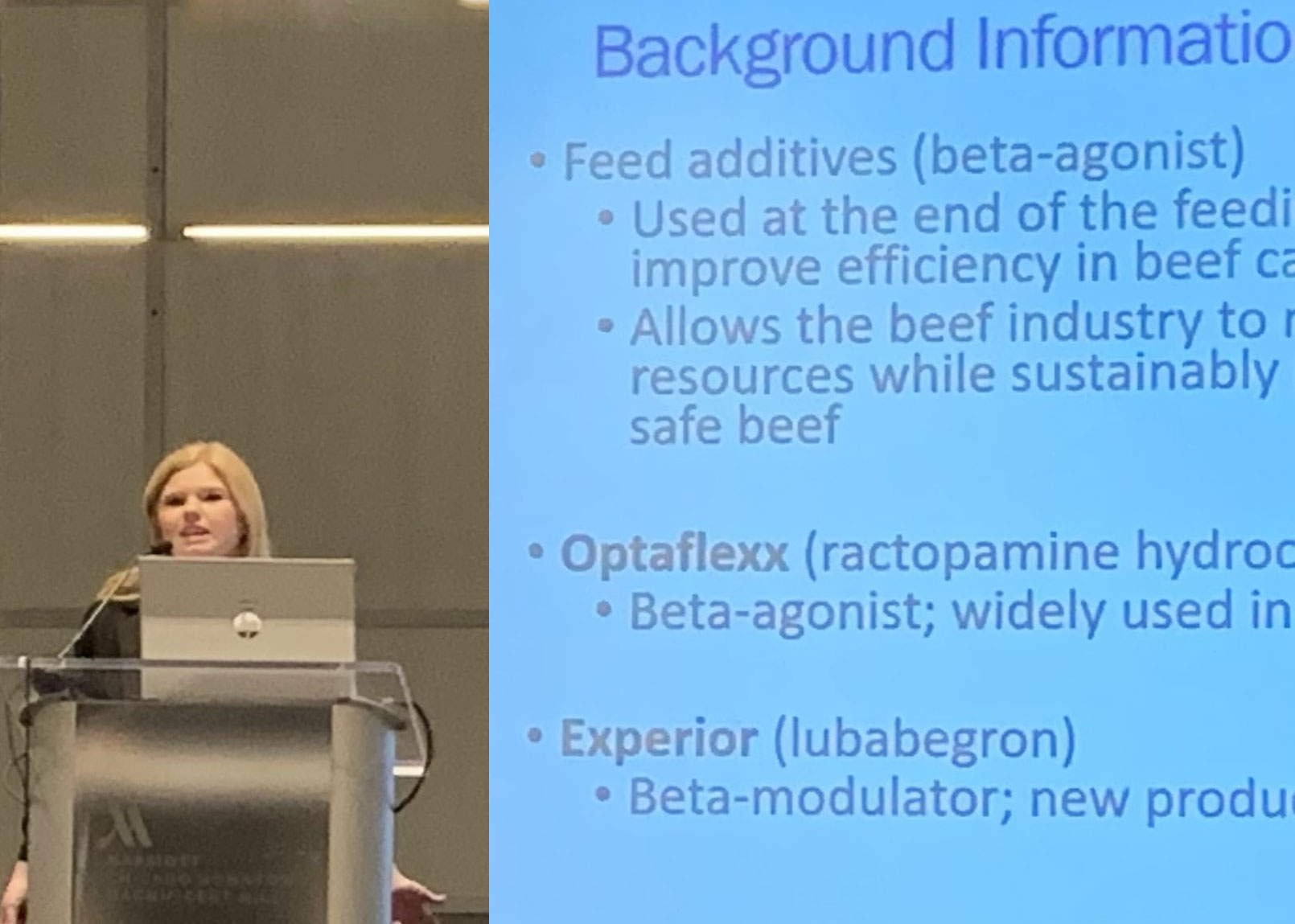
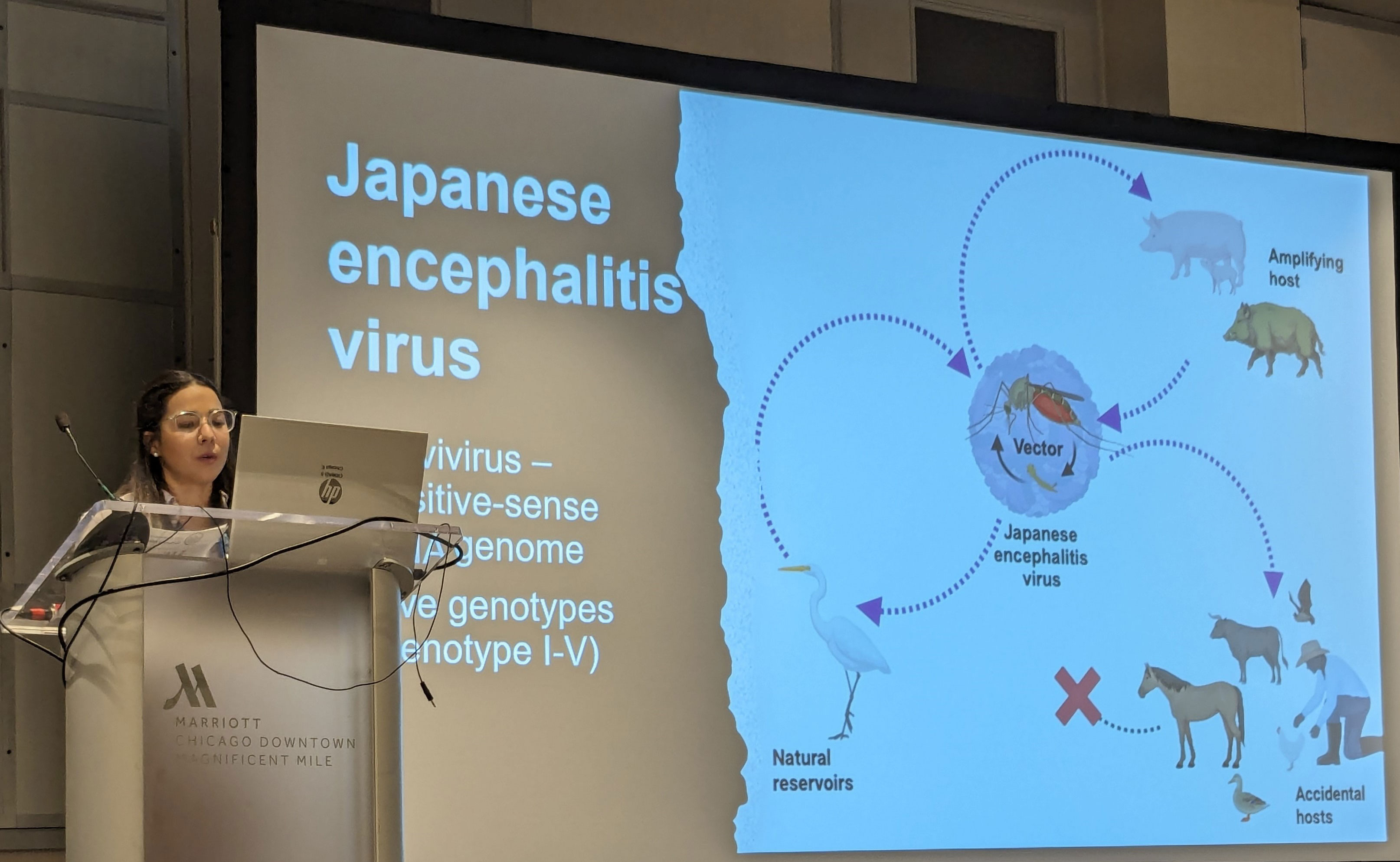
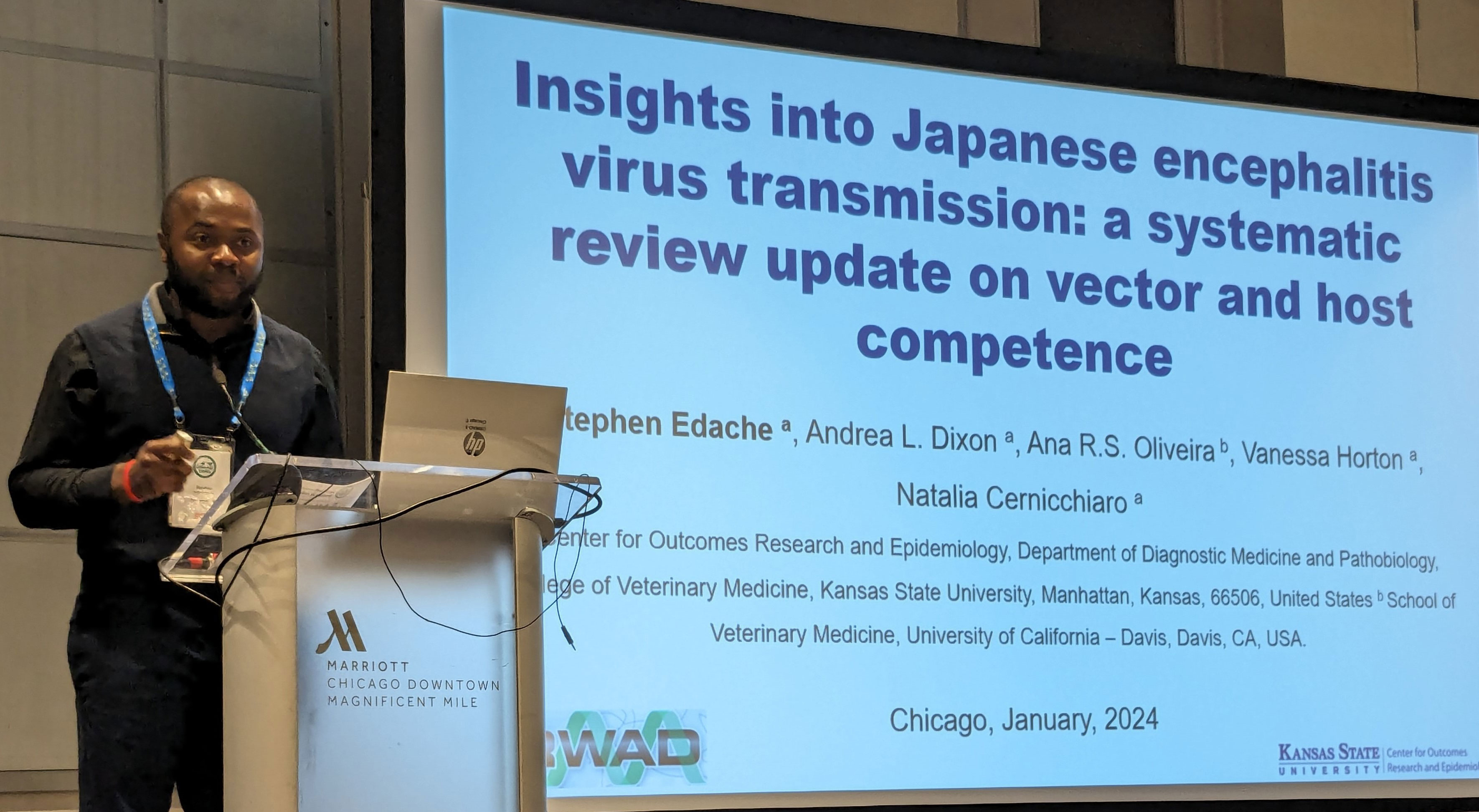
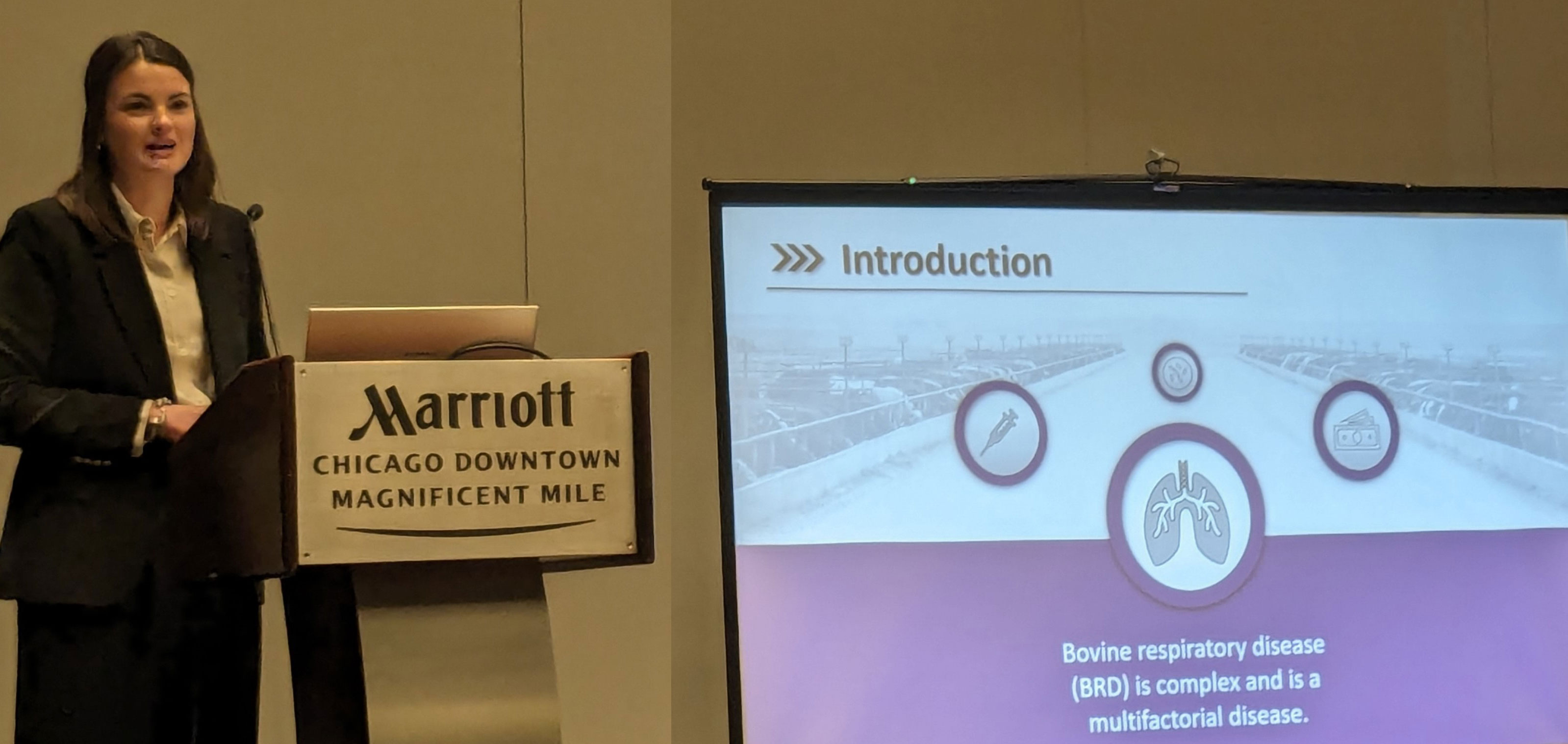
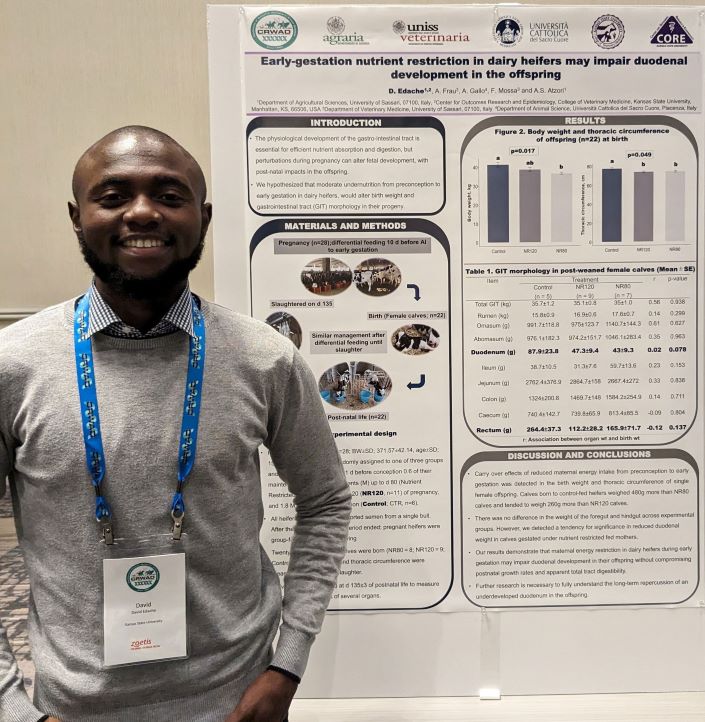
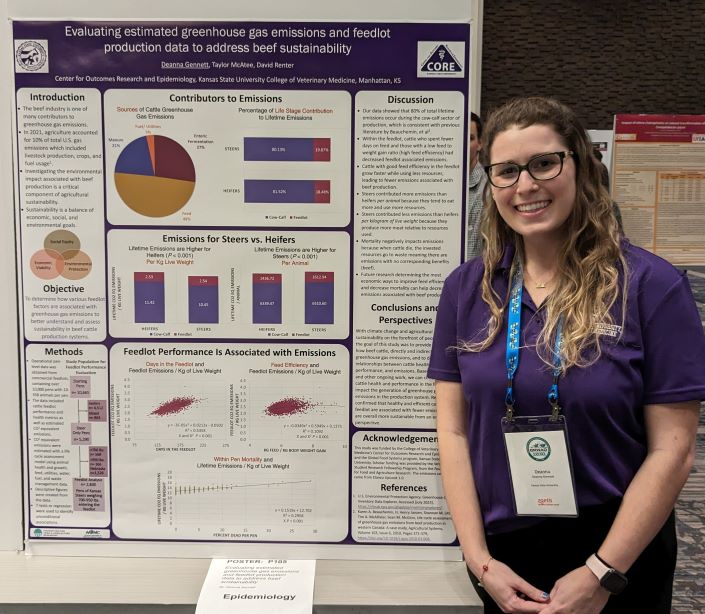
Taylor and Lucas also presented at CRWAD’s first ever Three Minute Thesis (3MT) competition.
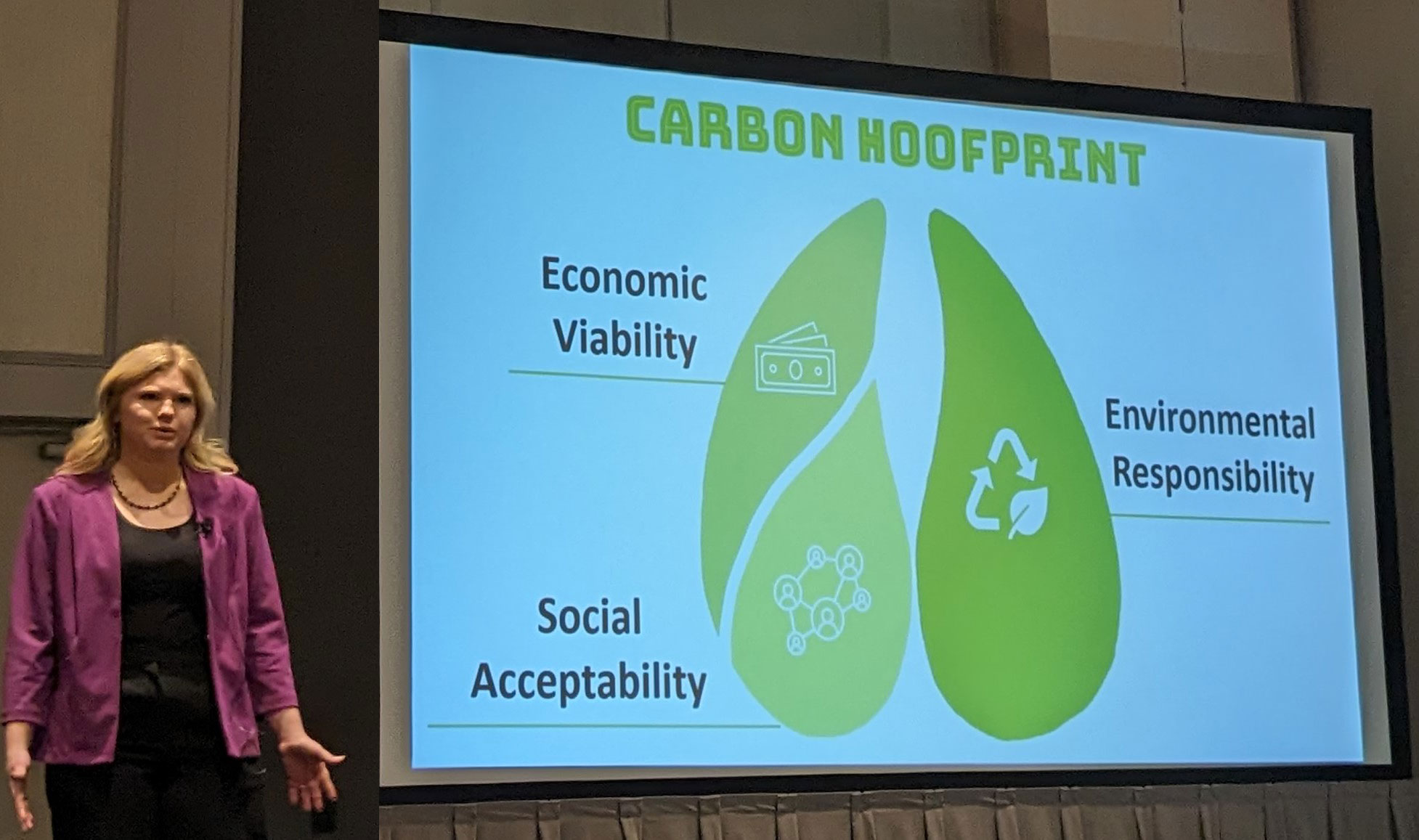
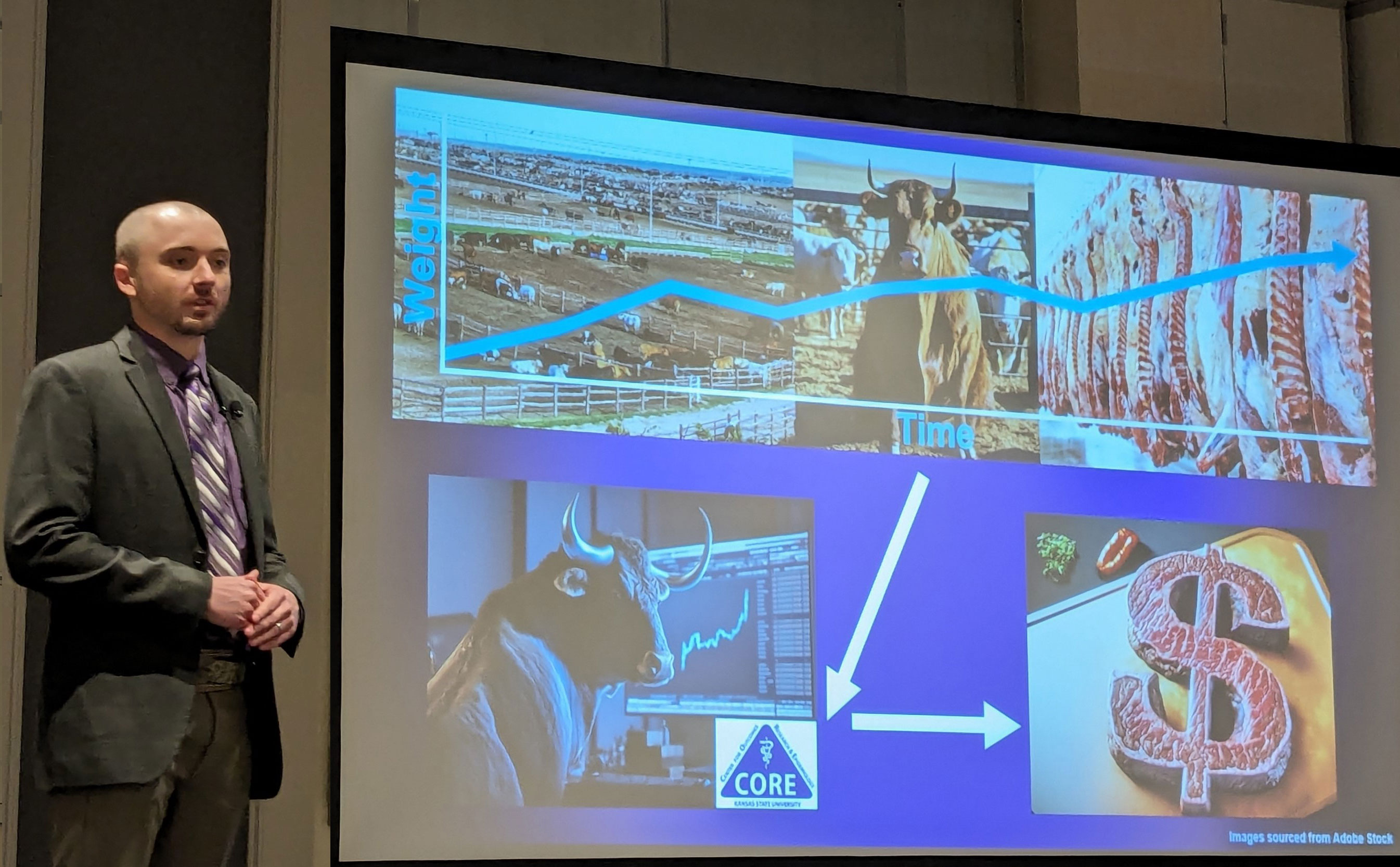
This year CORE was a sponsor of CRWAD.
Dr. David Renter was a keynote speaker for The Association for Veterinary Epidemiology and Preventive Medicine (AVEPM) Schwabe Symposium where he presented “Aligning valid research outcomes with stakeholder values.” The honoree this year was Jan Sargeant, DVM MSc PhD FCAHS, Professor Emerita, University of Guelph. Additional keynote speakers included Drs. Annette O’Connor and Audrey Ruple.
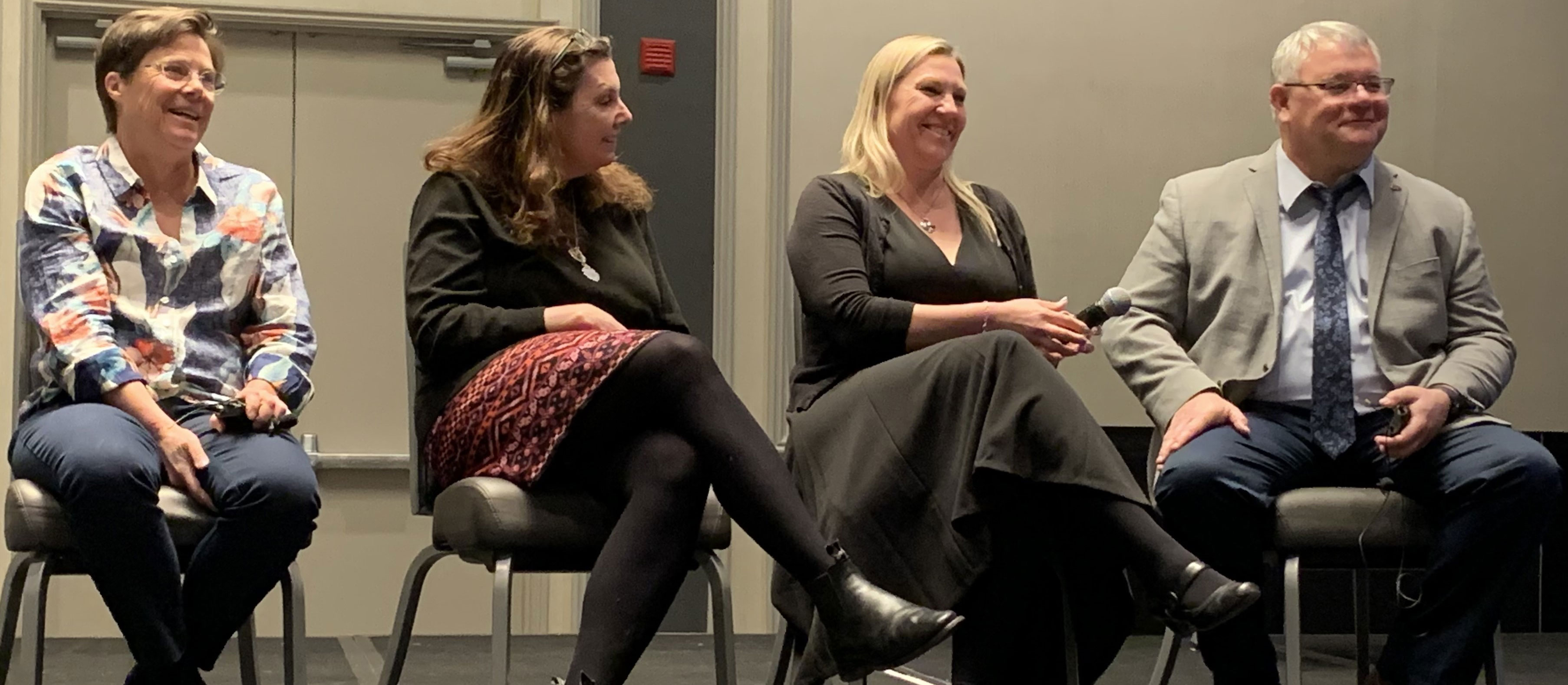
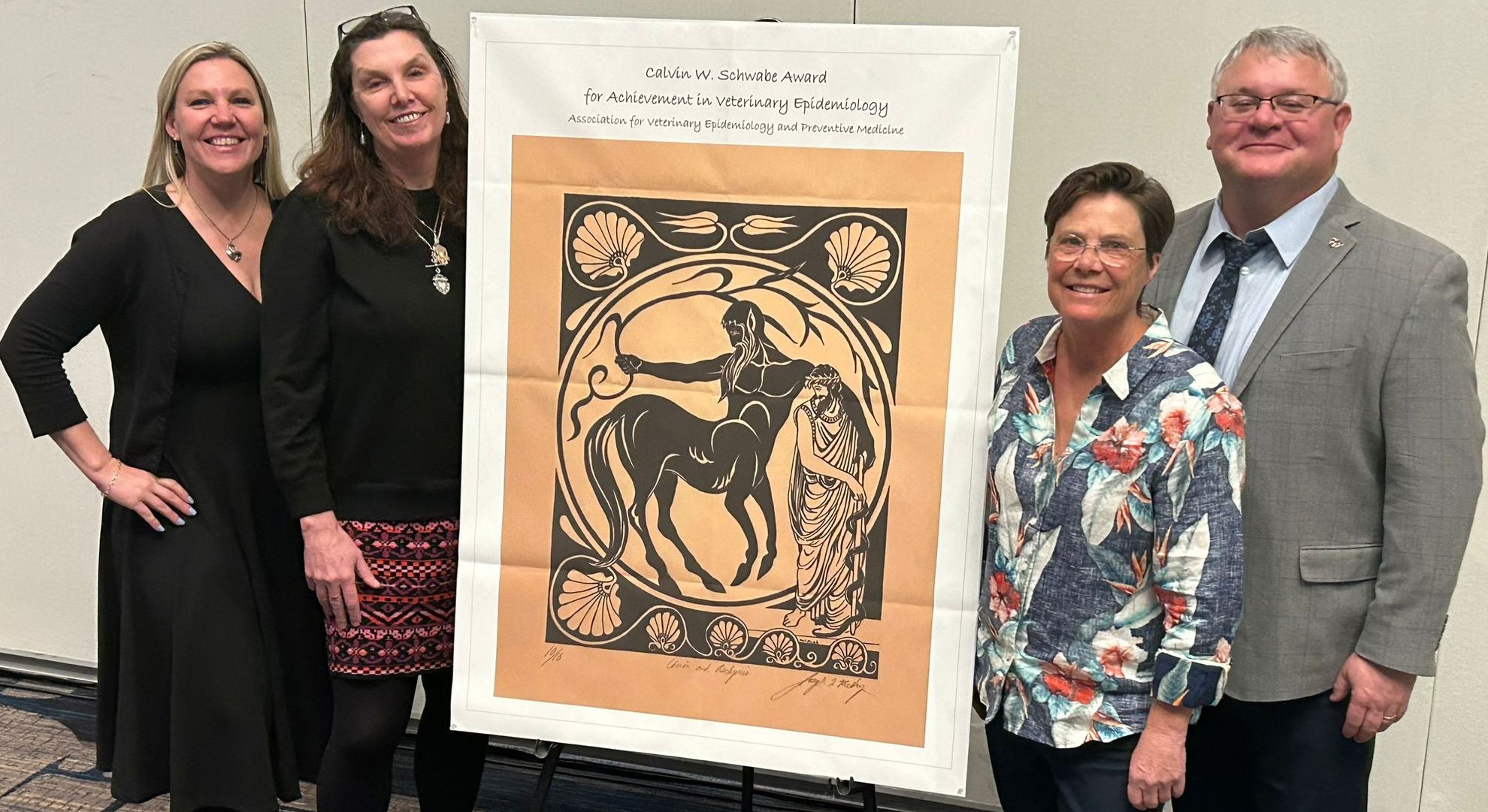
Dr. Natalia Cernicchiaro was elected to the CRWAD Council, the governing body of the Conference of Research Workers in Animal Diseases.
Both Taylor McAtee and Lucas Horton earned awards for their oral presentations. Taylor McAtee, PhD candidate at CORE, was awarded 2nd place in the AVEPM graduate student award competition for her presentation entitled “Comprehensive outcomes from a feedlot trial comparing ractopamine hydrochloride and lubabegron feed additives.” Lucas Horton, PhD candidate at CORE, was awarded 4th place in the AVEPM graduate student award competition for his presentation entitled “Economic considerations for extended feedlot heifer days-on-feed – sensitivity analyses from pooled clinical trials.”
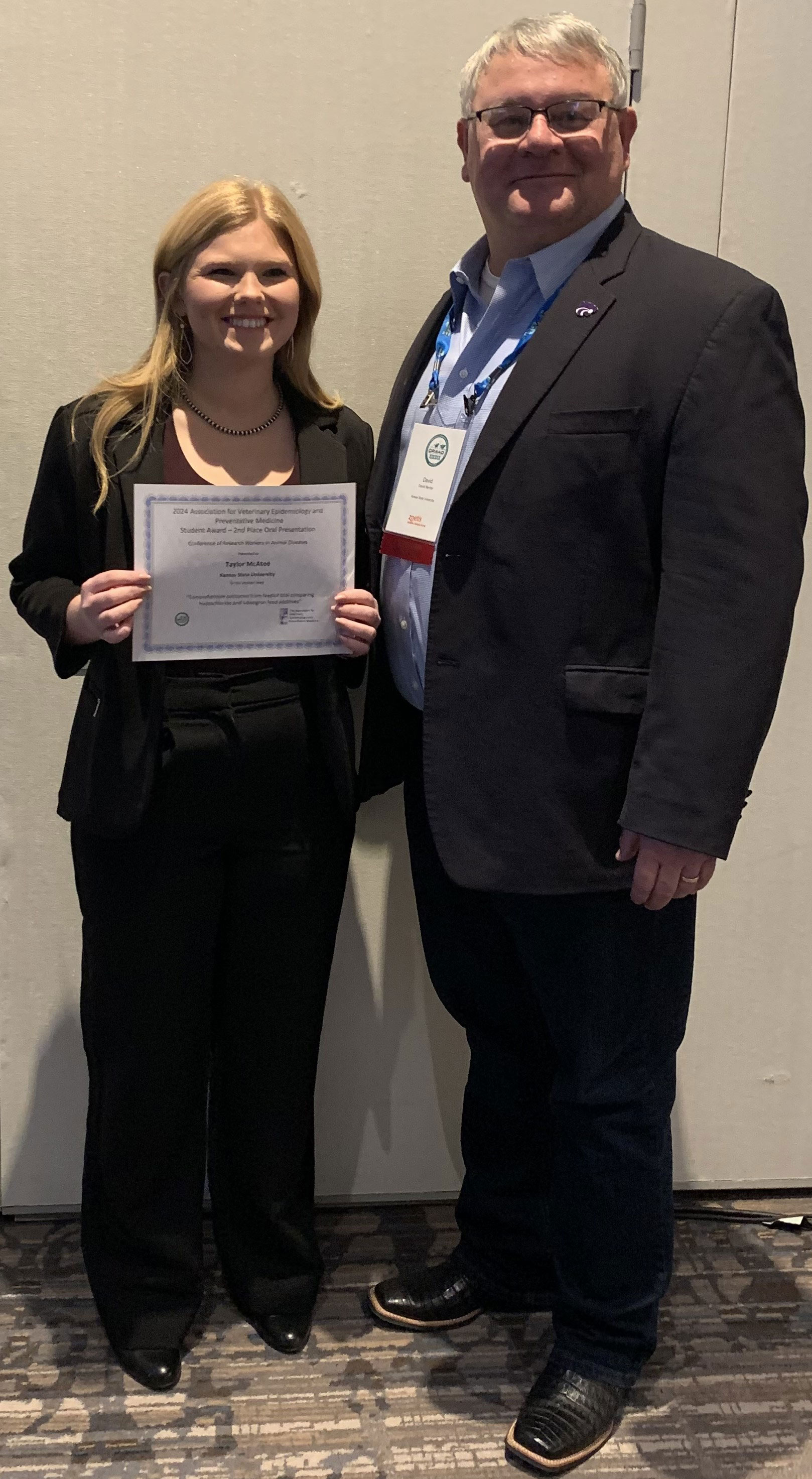
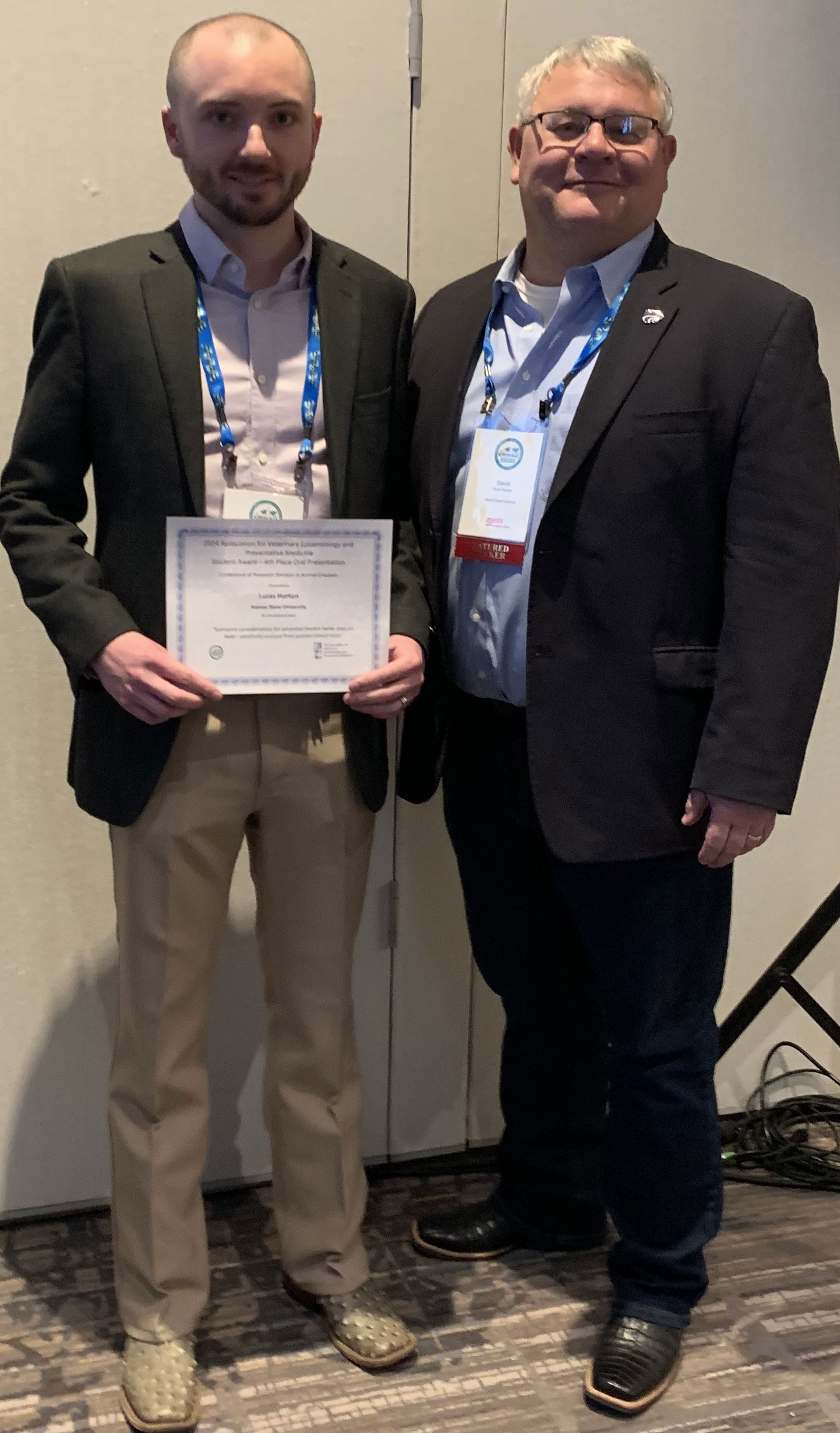
Grant awarded to Dr. Cernicchiaro and Dr. Renter
The Foundation for Food & Agriculture Research (FFAR) awarded Dr. Cernicchiaro and Dr. Renter a grant through the International Consortium for Antimicrobial Stewardship in Agriculture (ICASA) to better understand the data that are used to make decisions regarding metaphylaxis use for Bovine Respiratory Disease (BRD), particularly in cattle where the metaphylaxis decision is most challenging.
Core graduate student defends MS thesis
Dr. Stephen Edache presented his MS thesis defense titled “Assessing Salmonella enterica burden and control measures in dairy cattle” on November 1, 2023. Dr. Edache successfully defended his thesis, and he plans to stay at Kansas State University to continue a PhD program working with Dr. Natalia Cernicchiaro. Congratulations Stephen! 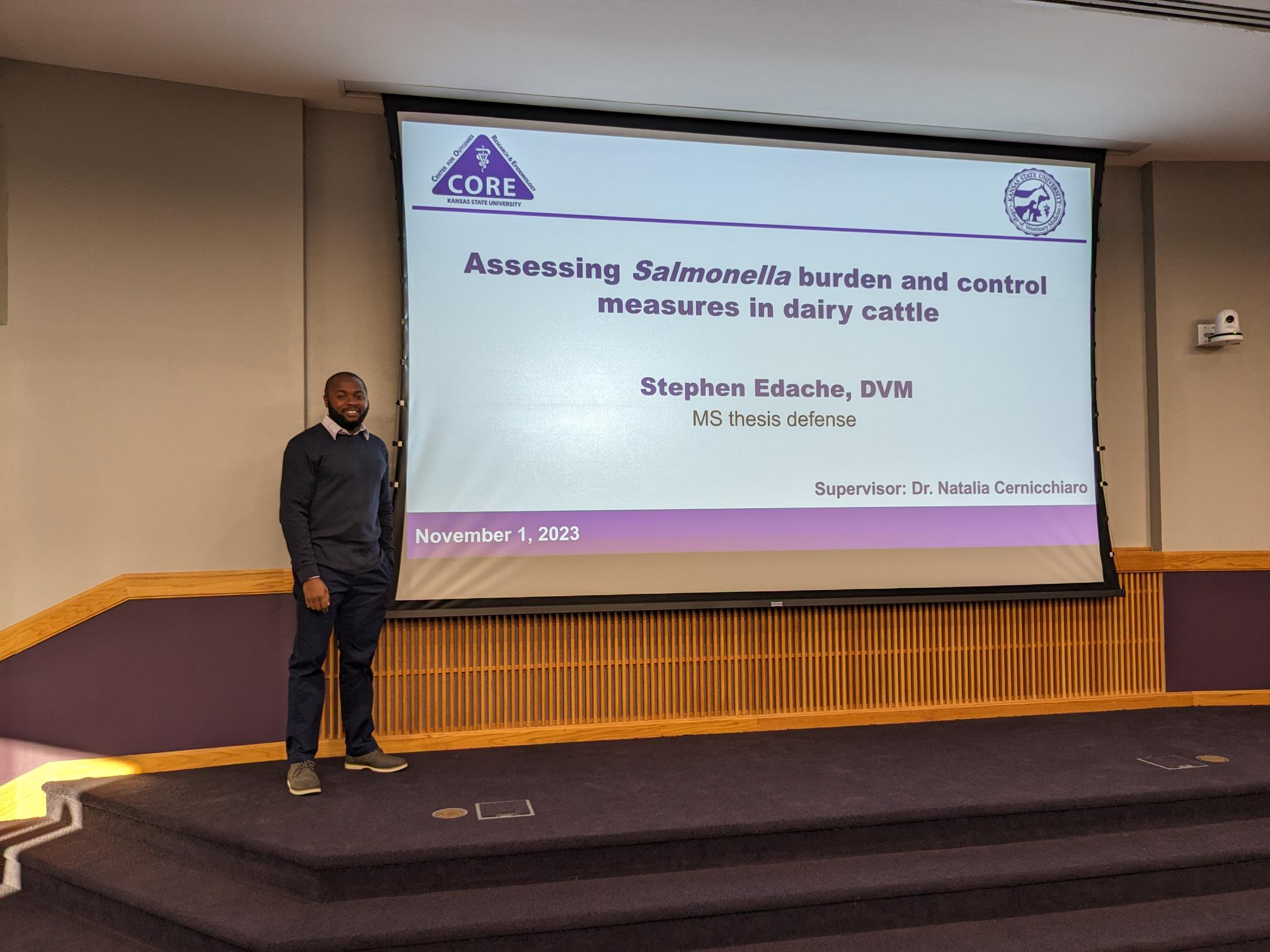
Renewal of the Dr. Robert MacDonald Professorship for Dr. David Renter
Dr. David Renter was awarded a 5-year renewal for the Dr. Robert MacDonald Professorship. This appointment is given to a faculty member based on professionalism, character and achievements in the field of safe food production for livestock to honor Dr. MacDonald.
Research Update: Dr. Natalia Cernicchario
Dr. Natalia Cernicchiaro was featured in the article “SHIC: Review reveals Japanese encephalitis virus knowledge gaps” by National Hog Farmer.
2023 VRSP Students
This summer, CORE had the opportunity to host two veterinary students participating in the Veterinary Research Scholars Program, a summer research program that gives veterinary students the opportunity to work with a faculty mentor on a summer research project. Abdulafees Hamzat, Class of 2024, worked on the project, “Assessing the risk of introduction, transmission, and establishment of the Japanese Encephalitis Virus in the United States” under the mentorship of Dr. Natalia Cernicchiaro. Deanna Gennett, Class of 2025, worked on the project, “Incorporating sustainability metrics in beef industry research” under the mentorship of Dr. David Renter. Deanna received a Veterinary Student Research Fellowship from the Foundation for Food and Agriculture Research and the American Association of Veterinary Medical Colleges for her project. Both Abdulafees and Deanna presented in San Juan, Puerto Rico at the 2023 National Veterinary Scholars Symposium.
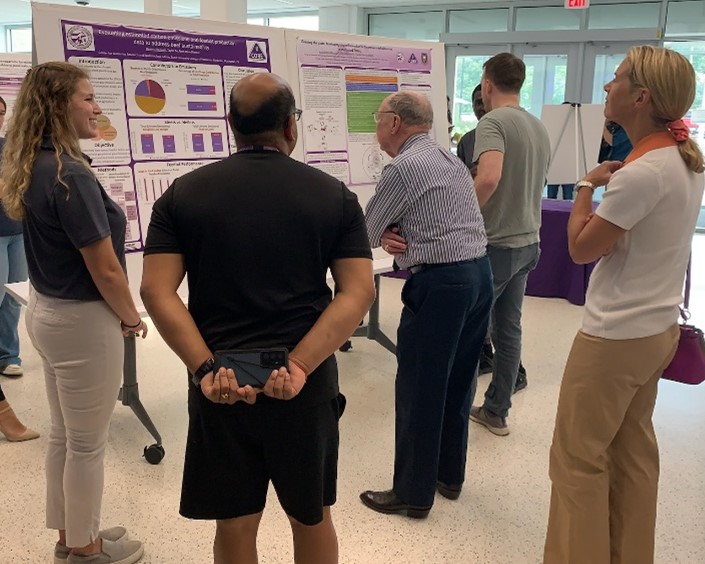
Cattlemen's Day 2023
Three CORE graduate students, Vanessa de Aguiar Veloso, Stephen Edache, and Taylor McAtee, presented posters at the 110th Cattlemen’s Day. Vanessa presented her poster titled “Effects of combining value-added programs on premiums for calves sold through the Superior Livestock Auction.” Stephen presented his poster titled “Evaluating the effectiveness of a postbiotic product to reduce Salmonella prevalence in the subiliac lymph nodes of cull dairy cattle.” Taylor presented her poster titled “Comprehensive assessment of feedlot health interventions using outcomes research in a sustainability context.”
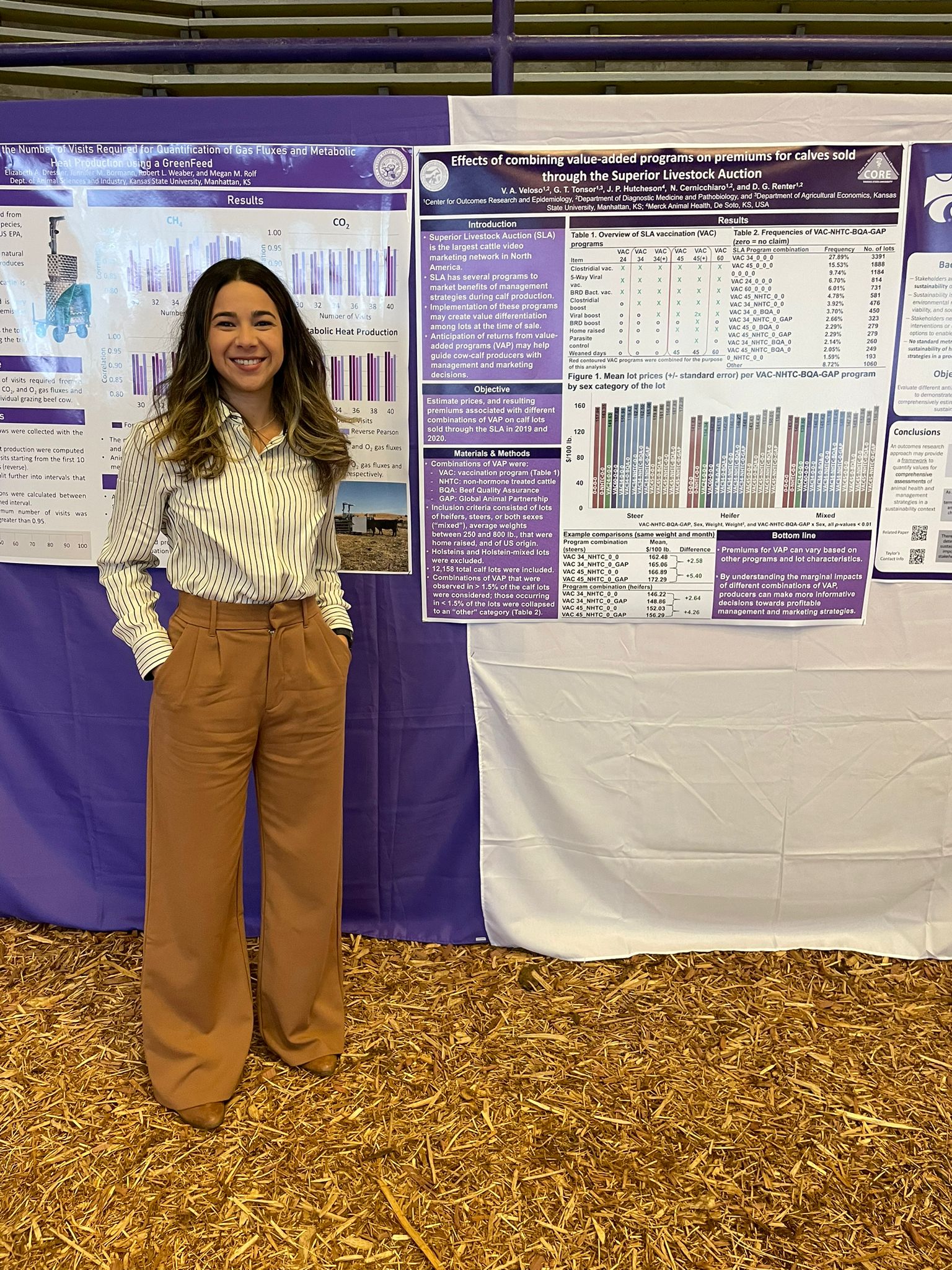 |
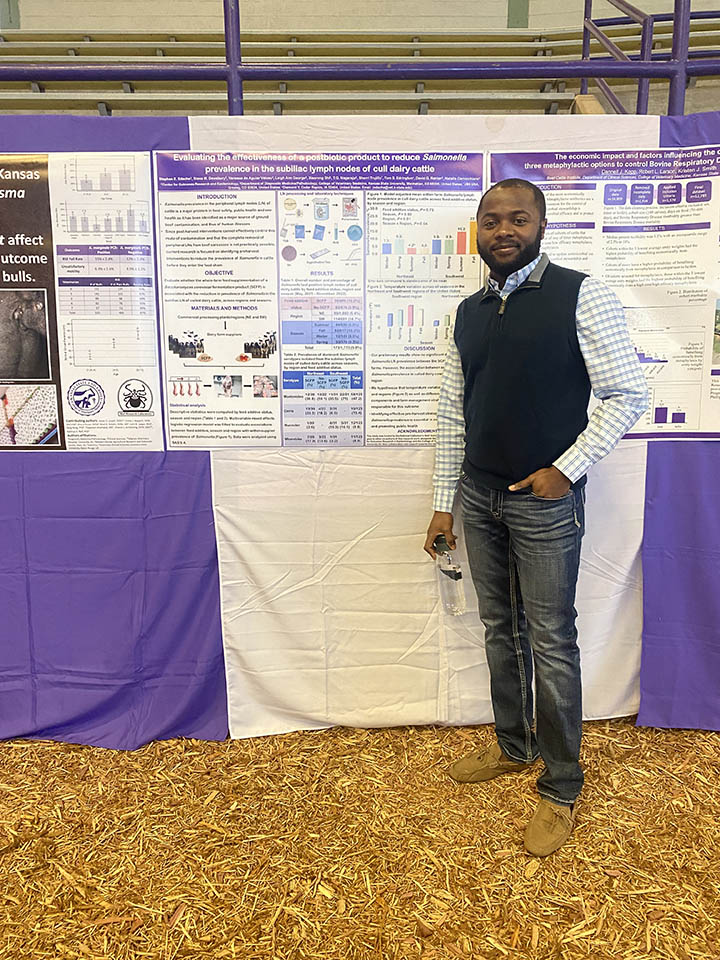 |
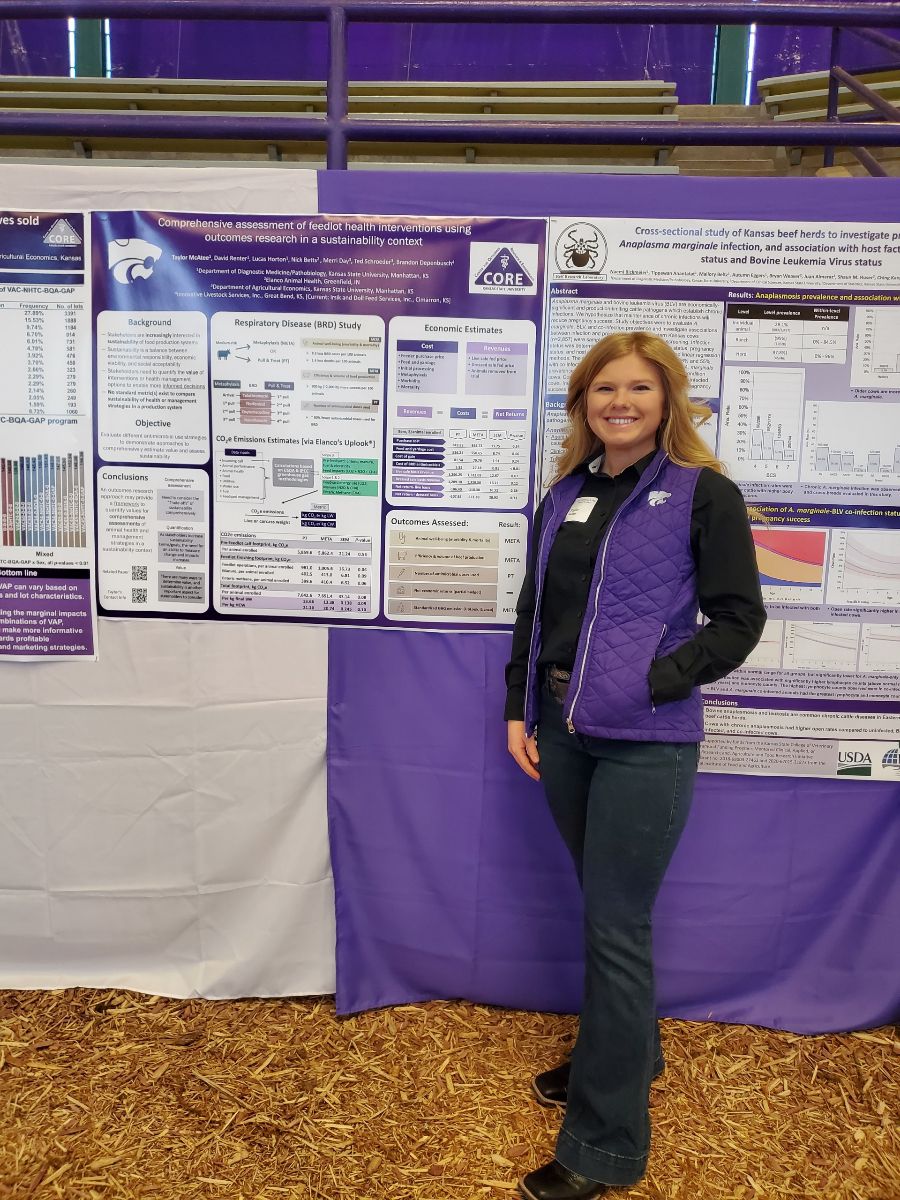 |
Phi Zeta Research Day 2023
Phi Zeta Research Day 2023 was March 7, 2023, and three CORE graduate students participated in the event. Lucas Horton gave an oral presentation titled “Pooled Analyses of Three Randomized Controlled Trials Comparing Effects of Two Hormonal Implant Programs and Differing Days-On-Feed on Carcass Characteristics and Feedlot Performance of Beef Heifers.” Taylor McAtee presented her poster, “Sustainability and Outcomes Research Approaches to Comprehensively Assess Interventions in Feedlots.” Stephen Edache presented his poster, “Evaluating the Effectiveness of a Postbiotic Product in Reducing Salmonella Prevalence in the Subiliac Lymph Nodes of Culled Dairy Cattle.” Stephen received the Dr. Harish C. and Ved K. Minocha Scholarship at the event.
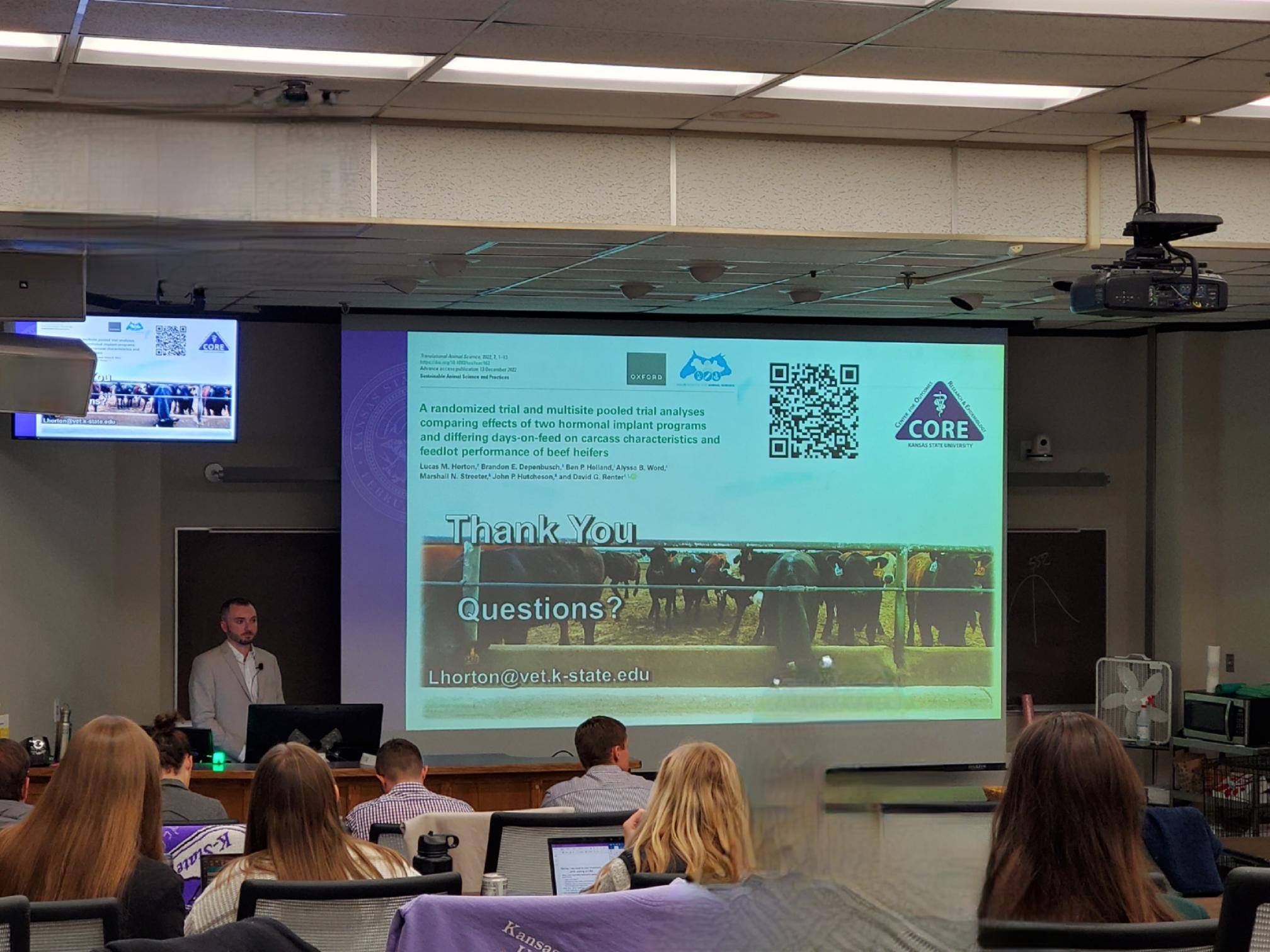
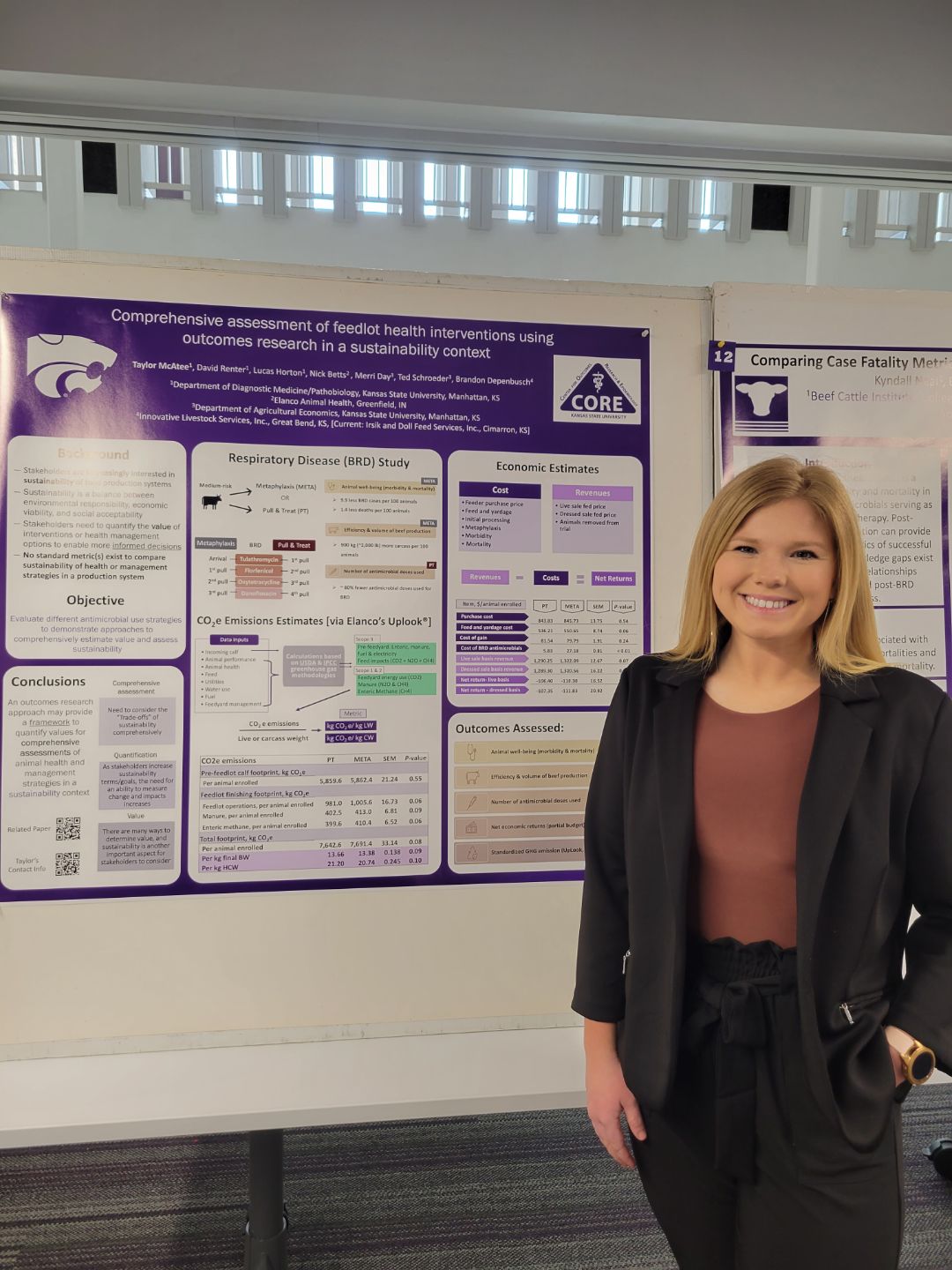 |
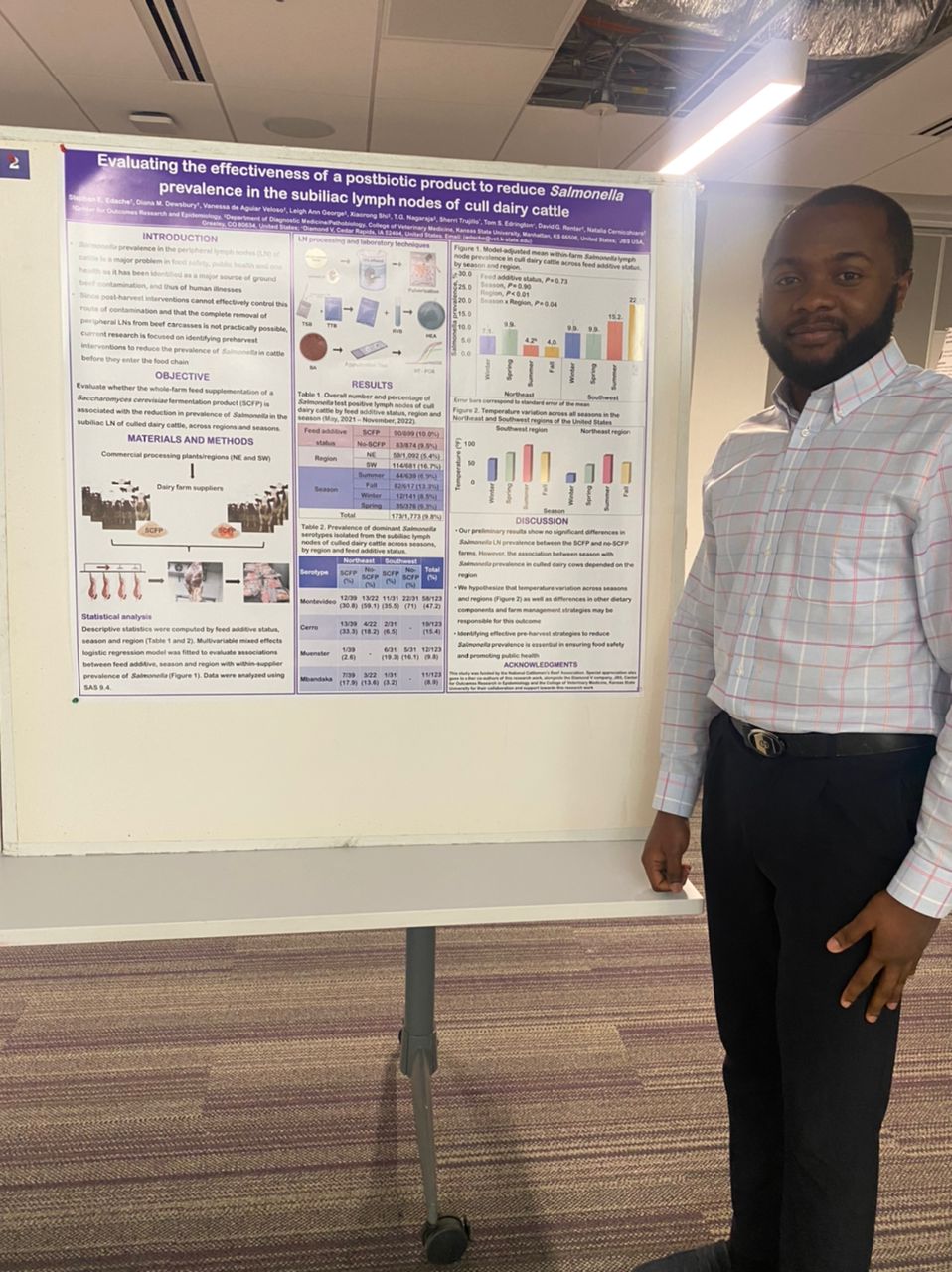 |
CORE members participate at CRWAD; Dr. David Renter selected as Fellow
CORE members participated in the Conference of Research Workers in Animal Diseases (CRWAD) 2023 held in Chicago, Illinois, with scientists and graduate students providing scientific presentations including Dr. Karla Moreno, Dr. Stephen Edache, Lucas Horton, and Taylor McAtee.
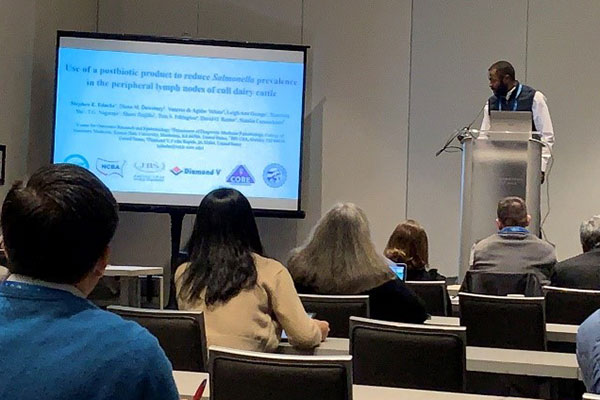
Dr. Stephen Edache
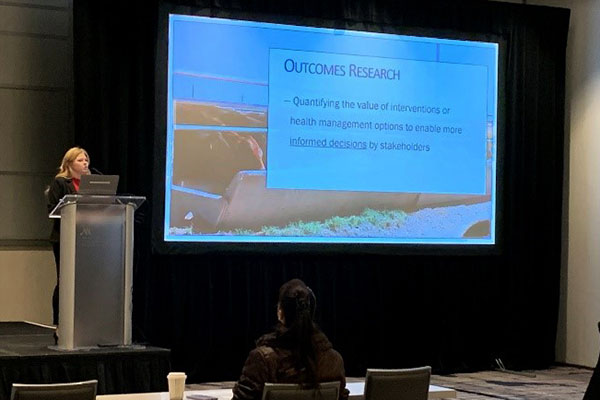
Taylor McAtee gives a presentation in Chicago
Lucas Horton, PhD candidate at CORE was awarded first place in The Association of Veterinary Epidemiology and Preventive Medicine (AVEPM) graduate student award competition for his presentation entitled “Outcomes affected by metaphylaxis from a clinical trial of feedlot calves at medium-risk for respiratory disease.
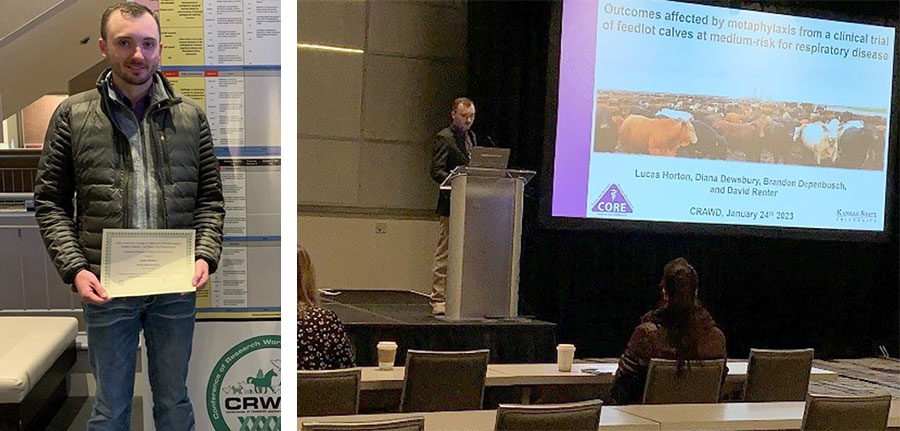
Congratulations to Lucas Horton on earning a first-place award
Dr. David Renter was elected as a CRWAD Fellow. He was one of nine international scientists recognized as a Fellow at the 2023 Annual Conference. Fellows of the Conference of Research Workers in Animal Diseases represent an eminent cadre of scientists from all types of research careers, including academia, industry, and government. Election as a CRWAD Fellow is a lifetime honor and all Fellows meet the highest standards of professional ethics and scientific integrity. Scientists recognized as CRWAD Fellows have distinguished research careers evidenced by the outstanding impact and importance of their work, and their ability to communicate and interpret science to stakeholders and the public. Fellows have made significant contributions to scientific literature reflecting fundamental discoveries and/or innovative applied research in animal health and disease, population health, and translational medicine. Reflecting the tradition and spirit of CRWAD, mentoring of young research scientists in furthering their careers is an important contribution of CRWAD Fellows. CRWAD Fellows are scientists who have made sustained and notable contributions to CRWAD through service or participation in the CRWAD organization and annual meetings.
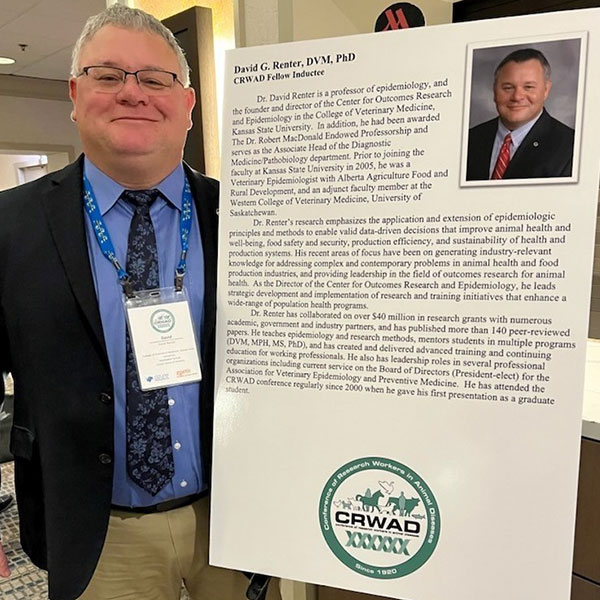
Dr. David Renter is elected as a CRWAD Fellow for 2023
This year, CORE helped sponsor the AVEPM Calvin Schwabe symposium entitled “Veterinary epidemiology and animal health economics: the way we were”. The honoree this year was Dr. Tim Carpenter, PhD MS, University of California, Davis. Additional keynote speakers included Drs. Karl Rich, Michael Ward, and Mark Stevenson.
Summer veterinary research program includes new mentoring award for Dr. Cernicchiaro
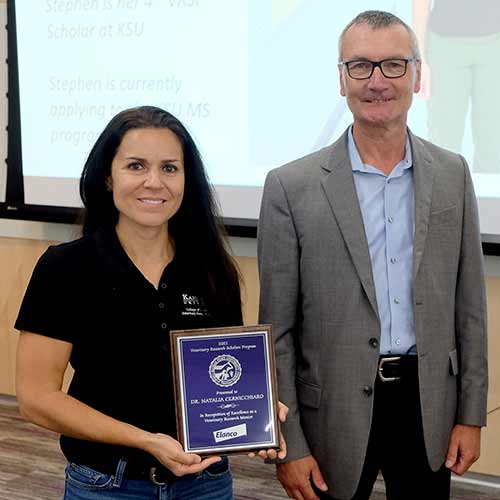
A select group of Kansas State University veterinary students spent this summer working with faculty mentors on high-level research projects. While hosting a record number of participants, the Veterinary Research Scholars Program presented a brand-new mentoring award to one of the faculty members on July 29.
"There are many excellent faculty researchers who mentor scholars in this program, both within the College of Veterinary Medicine and across the Kansas State University campus," said Kate KuKanich, professor of small animal internal medicine and director of the Veterinary Research Scholars Program. "Scholars work with their mentors day-to-day to learn laboratory techniques and various procedures for data collection, and participate in weekly journal clubs and interactive workshops to learn about research ethics, how to present research findings and veterinary career opportunities involving research."
This year, the competitive three-month summer program hosted 23 students who were then paired with faculty researchers.
"The goal of the Veterinary Research Scholars Program is to introduce veterinary students to biomedical research through an engaging summer experience and to encourage these talented veterinary professional students to enter veterinary careers involving research," KuKanich said. "At the end of the summer, scholars presented their research posters for K-State faculty and research colleagues, students, alumni, and corporate friends and donors. We were delighted to present an inaugural mentoring award to Dr. Natalia Cernicchiaro, who was nominated by Stephen Edache, a visiting scholar from Nigeria."
The mentoring award is sponsored by Elanco and includes a $1,000 stipend for the recipient.
"We had a number of excellent mentors nominated, confirming the strength of our mentor pool and the dedication of our mentors to their scholars and the VRSP, and we are so appreciative of Elanco for their support," KuKanich said.
Cernicchiaro, an associate professor of epidemiology, mentored Edache's project, which focused on how a preharvest fermentation product can reduce salmonella in cattle lymph nodes. Edache plans to return to K-State to work on a master's degree with Cernicchiaro after he completes his Doctor of Veterinary Medicine studies in Nigeria.
"I am truly honored and grateful to be the recipient of this inaugural award," Cernicchiaro said. "I have been extremely fortunate to work with brilliant and hard-working VRSP students over the years, and this year was no exception. The VRSP not only gives students an introduction to research but also faculty the possibility to attract and recruit very talented students for a graduate research program."
"We support the VRSP at K-State because we appreciate the role dedicated mentors make helping scholars be more successful and influence their potential career in research," said Ernst Heinen, vice president of clinical operations and technical development at Elanco, who was present to congratulate Cernicchiaro.
Other student projects this year included the use of various pharmaceutical substances to relieve pain in different species, analysis of SARS-CoV-2, vector-borne disease transmission and more.
DMP provides advanced training for graduate students through stakeholder partnerships
Kansas State University graduate students are getting advanced training and are making beneficial connections with industry and government partners through the Department of Diagnostic Medicine/Pathobiology in the College of Veterinary Medicine.
“When faculty and graduate students work directly with external partners in public and private sectors, their applied research is more relevant and impactful,” said Dr. David Renter, associate head of the department. “These collaborations also lead to better graduate program experiences for our students, and pathobiology program graduates with a more customized set of skills, abilities, and knowledge that are directly aligned with stakeholders needs.”
Dr. Renter said an established beef industry partnership has led to an innovative program designed to develop hands‐on skills that enable top‐quality research and science‐based health and production management decisions.
Lucas Horton works in the field to study beef production systems research.
Lucas Horton, a doctoral student in the pathobiology program, is receiving advanced training in epidemiology, research methods, and economics, and regularly works “in the field” on commercial beef production systems research with Dr. Brandon Depenbusch, vice president of cattle operations at Innovative Livestock Services (ILS), which Dr. Renter describes as one of largest and most innovative cattle feeding organizations in the Midwest.
“I think many past and present students would be envious of this opportunity presented to Lucas,” Dr. Depenbusch said. “This program offers a unique balance of applied field research with a first-class education. Our company benefits from having access to a very talented student to assist with in-house research trials and we get the opportunity to assist in the development of the next generation of researchers.”
Although Horton is just one year into his program, Dr. Renter said he has already contributed to projects addressing animal well-being, antimicrobial use, beef carcass quality, and production economics.
“Engagement with private industry and government organizations is integral to our land-grant mission as it enables us to serve the research and training needs of Kansas, the nation and the international community,” Dr. Renter added. “Many of our graduate students are ultimately employed by government organizations or private industry. Working directly with these stakeholders during their graduate programs can provide benefits for the student, faculty and stakeholders.”

Diana Dewsbury, who is pursuing her doctorate, contributes to research at the Veterinary and Biomedical Research Center Inc., or VBRC.
Diana Dewsbury is another student who is pursuing a doctorate while working directly with a private-sector partner. In addition to her academic training under her advisor Dr. Natalia Cernicchiaro, Diana regularly contributes to research at the Veterinary and Biomedical Research Center Inc., or VBRC.
“Working at VBRC has been a great learning experience and opportunity to collaborate with many different companies while gaining exposure to working with a variety of animal species, different study designs, and types of research studies,” Dewsbury said, citing good laboratory practices, good clinical practices, novel pilot work and challenge studies as examples. “After completing a master’s degree and working in industry for a few years, my current program provides unique practical experience and opportunity to be involved in study design, protocol development, live-phase animal research, statistical analysis, and reporting of study results.”
Dewsbury said that receiving top-notch academic training paired with opportunities to be involved in current animal health research in both academic and commercial industry settings is a unique opportunity that has been invaluable to her career and personal development.
“In addition to working with various sectors of private industry, our students and faculty also frequently collaborate with state and federal government organizations,” Dr. Renter said.
MaRyka Smith studied under Dr. Mike Sanderson on animal disease traceability.
MaRyka Smith, a concurrent Doctor of Veterinary Medicine/doctoral student, and her adviser, Dr. Mike Sanderson, are working with the Animal Disease Traceability group at the USDA’s Center for Epidemiology and Animal Health. Their collaborative work aims to help prepare plans for addressing a potential outbreak of food and mouth disease (FMD) in the United States. They will determine the impact of improved cattle traceability for FMD response and how to optimize resources for enhanced traceability.
“Working with our collaborators at the USDA has allowed me to not only to be involved in research that benefits animal health, but also to get an inside look at potential career paths outside of academia and industry,” Smith said.
Dr. Sanderson added, “The funding from CEAH allows us to do important work that will have a positive impact on agriculture and animal health policy decisions.”
“These students and others like them are having extremely important positive impacts on real-world problems,” Dr. Renter said. “Through their unique experiences and training, they will be well-prepared to address the future needs of our stakeholders.”
CORE co-sponsored ISESSAH 2019 Conference
CORE co-sponsored the ISESSAH 2019 Conference held in Atlanta, GA July 20 & 23, 2019. Drs. David Renter, Dustin Pendell, Diana Valencia, and Joaquin Baruch served on the Scientific Committee. Dr. Dustin Pendell also served on the Local Organizing Committee.
Dr. David Renter chosen for Dr. Robert MacDonald Professorship
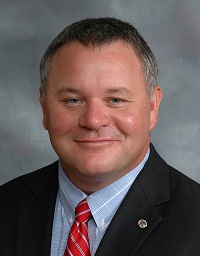 Dr. David Renter was recently appointed to the Dr. Robert MacDonald Professorship for his professionalism, character, and achievements in the field of safe food production from livestock. The purpose of this professorship is to perpetuate the memory of Dr. MacDonald, a 1940 alumnus of the College of Veterinary Medicine at Kansas State University. As the recipient of this endowed professorship, Dr. Renter is charged to reflect the integrity, devotion, and humane consideration that was exemplified by Dr. MacDonald throughout his career.
Dr. David Renter was recently appointed to the Dr. Robert MacDonald Professorship for his professionalism, character, and achievements in the field of safe food production from livestock. The purpose of this professorship is to perpetuate the memory of Dr. MacDonald, a 1940 alumnus of the College of Veterinary Medicine at Kansas State University. As the recipient of this endowed professorship, Dr. Renter is charged to reflect the integrity, devotion, and humane consideration that was exemplified by Dr. MacDonald throughout his career.
Dr. Renter has been a faculty member in the College of Veterinary Medicine since 2005, and is currently a professor of veterinary epidemiology. He is also the founder and director of the Center for Outcomes Research and Epidemiology, an interdisciplinary hub for collaboration that uses quantitative approaches to enhance animal health for the benefit of animals and our society. During his career, he has been instrumental in developing major animal health and food safety programs that have engaged students, practitioners, industry leaders, government agencies, and faculty from multiple institutions. His work has addressed issues important to Kansas, the nation, and the world; his leadership in this domain has been recognized internationally. Upon learning of this appointment, Dr. Renter said: “I am privileged to have the opportunity to further benefit the health of animals while protecting public health through the promotion of food safety. The most rewarding part of my career is seeing my former students carrying this work forward into their own leadership roles and making positive impacts on the veterinary profession, animal science, and society as a whole.”
Dr. Renter's faculty page
Dr. Tariku Jibat Beyene Presented at the Applied Statistics in Agriculture Conference
Dr. Beyene, CORE Postdoctoral Research Associate, presented two sessions at the Kansas State University Applied Statistics in Agriculture conference on May 7-8, 2018. More information is available at http://conferences.k-state.edu/applied-stats/speakers/tariku-jibat-beyene/
CORE hosted Dr. Bruce Wagner, USDA Center for Epidemiology and Animal Health (CEAH)
CORE hosted Dr. Bruce Wagner, the Director of the USDA Center for Epidemiology and Animal Health (CEAH), March 27-28, 2018. Dr. Wagner presented a seminar “The Center for Epidemiology and Animal Health: Mission, Scientific Focus, Collaborative Opportunities.”
Dr. Victor Del Rio Vilas Presented a CORE Seminar October 2018
The Center for Outcomes Research and Epidemiology (CORE) sponsored a seminar by Dr. Victor Del Rio Vilas “Operationalization of One Health in Eastern Africa: Organizational and Methodological Challenges” on October 23, 2018. Dr. Victor Del Rio Vilas (DVM, MBA, MSc (Epi), PhD) is at the Dept. of Epidemiology, School of Veterinary Medicine, University of Surrey (UK), and at the Centre on Global Health Security at Chatham House, London. Until January 2018, he worked at the World Health Organization (WHO) on the development of an epidemic vulnerability evaluation framework. Until November 2016, Dr. Del Rio was a consultant with the Pan American Health Organization (PAHO/WHO), based in Rio de Janeiro (Brazil) with regional responsibilities. In that capacity, Dr. Del Rio advised Ministries/Departments of Health across the region on epidemiology, surveillance and control measures for a number of diseases such as rabies, leishmaniasis, yellow fever and on zoonoses programmatic issues. He also contributed to WHO’s global response to the outbreak of Ebola Virus Disease in Liberia in 2015, previously worked in Uzbekistan implementing the Biological Threat Reduction Program (Defense Threat Reduction Agency, US DoD), and as veterinary advisor and epidemiologist for UK´s Department for Environment, Food and Rural Affairs (Defra) and the Veterinary Laboratories Agency, respectively.
CORE Faculty and Students Engaged in National and International Conferences
CORE faculty and graduate students participated in and presented at The 15th International Symposium of Veterinary Epidemiology and Economics (ISVEE) held November 12-16, 2018, in Chiang Mai, Thailand.
The 99th Annual Conference of Research Workers in Animal Diseases (CRWAD) was held December 1-4, 2018, in Chicago. Several CORE faculty and graduate students gave presentations at CRWAD as well.
Dr. Charley Cull Recognized as a Distinguished Young Alumni
Dr. Charley Cull, former CORE graduate student, will be recognized at the 7th Annual Distinguished Young Alumni Award program! The K-State Alumni Association and Student Alumni Board sponsor this program to honor outstanding accomplishments of young graduates of Kansas State University.
CORE Seminar - Dr. Audrey Ruple, University of Purdue
The Center for Outcomes Research and Epidemiology hosted Dr. Audrey Ruple from the University of Purdue. Dr. Ruple presented a seminar titled “Comparative medicine – dogs can talk if you know how to listen” on December 12, 2018.
Dr. Audrey Ruple is recognized nationally and internationally as a thought-leader in the field of “One Health,” the intersection of human, animal, and environmental health. Her diverse educational background and extensive experiences in companion animal epidemiology lend themselves to her research in both comparative/translational medicine and infectious diseases that occur at the human-animal interface. She obtained her DVM, MS, and PhD degrees from Colorado State University, is a Diplomate of the American College of Veterinary Preventive Medicine, and is a Member of the Royal College of Veterinary Surgeons. She is an advocate for equality both within and outside of the veterinary profession and serves as the Chair of the Equity and Diversity Committee for Purdue University.
University collaboration set to spark breakthroughs in human, animal health
Dr. Renter and CORE are involved in the 1Data collaborative project with K-State, K-State Olathe and UMKC. It establishes a new standard for analyzing human and animal health information and creates the next generation of approaches to curing or mitigating human and animal diseases.
CORE Special Seminar
The Center for Outcomes Research and Epidemiology hosted a special seminar titled “Towards reproducible research in animal health and production” on Friday, February 24, 2017, in the Mara Conference Center, 4th floor Trotter Hall. The seminar presenters were Dr. Nora Bello, Department of Statistics and Dr. David Renter, Department of Diagnostic Medicine/Pathobiology.
Dr. David Renter participated in the XXIX World Buiatrics Congress 2016 in Dublin, Ireland
Dr. Renter participated in the XXIX World Buiatrics Congress 2016 in Dublin, Ireland July 3-8. WBC is recognized worldwide as the premier cattle congress in the world, exploring the study of cattle and their diseases.
Dr. Natalia Cernicchiaro instructed one-week course on Veterinary Epidemiology at the University of Uruguay
Dr. Natalia Cernicchiaro recently returned to Uruguay to instruct a second one-week course on Veterinary Epidemiology to graduate students, veterinarians, and other health professionals at the College of Veterinary Medicine, University of Uruguay in Montevideo, Uruguay. The course provided students with epidemiological concepts and techniques regarding study design and analysis and interpretation of observational data with emphasis on analysis of dichotomous outcomes.
CORE faculty members presented at the 2016 Conference on Applied Statistics in Agriculture
Drs. Elva Cha and Nora Bello presented “Using Structural Equation Models to Assess Causal Relationships Between Health and Performance Outcomes in Feedlot Cattle” at the Conference on Applied Statistics in Agriculture which was held May 1-3, 2016 in Manhattan, KS. Others that were involved in this study are Drs. Mike Sanderson, Natalia Cernicchiaro, Abigail Jager and David Renter.
Dr. Charley Cull receives prestigious Mark Gearhart Memorial Graduate Student Award
A research paper written by a Kansas State University College of Veterinary Medicine doctoral student in pathobiology and Doctor of Veterinary Medicine graduate has earned the 2015 Mark Gearhart Memorial Graduate Student Award from the Association for Veterinary Epidemiology and Preventive Medicine.
Dr. Renter will serve on the Outcomes Research and Health Information Technology Working Group
Dr. David Renter has been asked to serve on the Outcomes Research and Health Information Technology Working Group, for the Kansas City Regional Strategic Assessment, established by the Kansas City Area Life Science Institute (KCALSI). During the strategic planning process, outcomes research and health IT was identified as one of the four primary focus areas.
CORE faculty present at ISVEE 14 in Mexico
Several of the CORE faculty members attended and presented at the 14th Conference of the International Society for Veterinary Epidemiology and Economics (ISVEE 14) November 3-7, 2015, in Merida, Yucatan, Mexico. One of the presentations was a poster by David Renter, Natalia Cernicchiaro, Christy Hanthorn, Robert Larson, Brad White and Michael Sanderson titled “Center for Outcomes Research and Education – applied epidemiology and economics for quantifying the value of animal health initiatives.”
Dr. David Renter gave a presentation on the Center for Outcomes Research and Education at the Community Practice Leadership Summit
Dr. Renter gave a presentation on July 30, 2015, titled “Initiatives at the Center for Outcomes Research and Education” at the Community Practice 2015 Leadership Summit that took place at the University of Kansas.
Dr. Renter did a radio interview for Agriculture Today on Bovine Respiratory Disease
K-State veterinarian David Renter talks about a new USDA-funded project he'll oversee, which will investigate the factors that lead to bovine respiratory disease in feeder cattle...this is expected to be the most comprehensive study of B-R-D undertaken to date, researching the causes of a disease complex which costs the beef cattle industry billions of dollars each year.
A multidisciplinary research team from Kansas State University will study risk management strategies to help reduce the health and economic effects of bovine respiratory disease complex in commercial feeder cattle.
The College of Veterinary Medicine establishes the Center for Outcomes Research and Education
The College has established a new center of excellence that may be the first of its kind in animal health. On Feb. 25, the Center for Outcomes Research and Education, or CORE, will be publicly launched under the guidance of Dr. David Renter, a veterinary epidemiologist who will be the center's director. With a goal of improving effectiveness and efficiency in animal health care and its associated impacts on human health, the center will focus on demonstrating the value of animal health interventions — including treatment, prevention or diagnostic activities intended to improve health.
Dr. Bob Larson analyzes cost-effectiveness of veterinary interventions
In business, we often hear that we need to spend money to make money. That concept certainly applies to animal health in our clients’ operations, where investments in prevention and control of diseases, parasites and injuries pay off by improving productivity and reducing economic losses associated with animal morbidity and mortality. But, of course, the devil is in the details, and it falls upon the veterinarian to objectively evaluate the costs and benefits of prevention and control programs.
Recent study models FMD vaccine strategies
Findings of a recent study indicate that, in a foot-and-mouth disease outbreak, vaccinating susceptible animals living in a broad geographic area could result in a shorter outbreak with fewer herds depopulated. Biosecurity measures, early detection of infections, and control of contacts between farms also could decrease the duration and harm from such an outbreak.
Develop a control strategy for your herd using the BVD CONSULT
BVD CONSULT is a website designed to aid cattle producers and veterinarians in creating Bovine Viral Diarrhea control, prevention and eradication strategies that are specific to individual herds. From this site you can access peer-reviewed research articles that pertain to the information found in BVD CONSULT. You can also access other peer-reviewed BVD articles. If you are looking for more information about the disease, look here.
See our official announcement at the Kansas State University News and Communications Services website: “College of Veterinary Medicine establishes Center for Outcomes Research and Education”
Newsletters
CORE Newsletter - January 2019
A Message from the Director
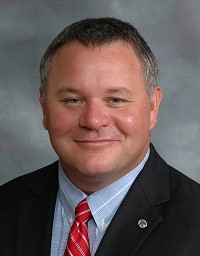 Greetings from the Center for Outcomes Research and Epidemiology (CORE). It was a good year for CORE in 2018, and we anticipate even bigger and better things for CORE and our collaborators in 2019!
Greetings from the Center for Outcomes Research and Epidemiology (CORE). It was a good year for CORE in 2018, and we anticipate even bigger and better things for CORE and our collaborators in 2019!
In our last newsletter, we highlighted some of our excellent collaborations with industry partners and the positive impacts on student training, research, continuing education, and strategic development. These collaborations continue to be a cornerstone of our CORE mission and building blocks for future success.
One 2018 milestone was a successful College administrative review of our Center. It was a pleasure to take some time to share our accomplishments. Highlights for the 3-year review period included: development of new training programs, research initiatives and revenue streams; engagement in regional, national, and international animal health and public health outreach activities; and faculty involvement in nearly $40 million of grants, 178 peer-reviewed papers, and mentoring nearly 50 graduate students. Our feedback from administration was “excellent”, and because we highly value collaboration, we were particularly proud that our Center was recognized as “much more than a collection of individuals”.
It is those individuals – the excellent faculty, students, staff and collaborators – that enable our success. I am grateful to often hear that the best part of CORE is the “people I work with every day”. Below we have highlighted two graduate students, the addition of new staff and faculty members, and a few achievements of the current people and alumni of CORE. In addition, we are very pleased that Drs. Natalia Cernicchiaro and Mike Sanderson have agreed to serve as Associate Directors of CORE, and that Drs. David Gnad (Managing Partner, Nebraska Veterinary Services) and Bruce Wagner (USDA Center for Epidemiology and Animal Health) have agreed to serve on our Advisory Council.
We are excited about the coming year and the great people, both internally and externally, that we get to work with. Please contact us to learn more about CORE and opportunities to collaborate or support our Center.
Thank you for your interest in CORE!
David Renter, Director of CORE, drenter@vet.ksu.edu
Diana Valencia, PhD Student, CORE Research
 I am a new PhD student, as of May 2018, advised by Dr. Natalia Cernicchiaro within the CORE at Kansas State University (K-State). In 2015, I received my MS from K-State, under the supervision of Drs. Cernicchiaro and Renter, focusing on the epidemiology of Shiga toxin-producing E. coli in feedlot cattle. For the past three years, I worked in industry as part of a global bovine biologics research and development team. The focus of my PhD will be on veterinary epidemiology and outcomes-based research. Upon my return as a doctoral student, I have been involved in a few experimental trials through CORE in collaboration with researchers from industry and private sectors.
I am a new PhD student, as of May 2018, advised by Dr. Natalia Cernicchiaro within the CORE at Kansas State University (K-State). In 2015, I received my MS from K-State, under the supervision of Drs. Cernicchiaro and Renter, focusing on the epidemiology of Shiga toxin-producing E. coli in feedlot cattle. For the past three years, I worked in industry as part of a global bovine biologics research and development team. The focus of my PhD will be on veterinary epidemiology and outcomes-based research. Upon my return as a doctoral student, I have been involved in a few experimental trials through CORE in collaboration with researchers from industry and private sectors.
My multidisciplinary graduate research program is somewhat non-traditional as I am now co-sponsored by CORE/K-State and the Veterinary and Biomedical Research Center Inc. (VBRC). Through this program, I receive the curriculum (graduate courses, mentoring/training, dissertation, etc.) needed to complete a PhD, while concurrently obtaining hands-on research experience by participating in research studies conducted at VBRC. Besides being a very enriching opportunity for me, this partnership strengthens collaboration between VBRC and CORE, in terms of training, research, and funding prospects related to current opportunities in animal health and production.
My primary research project this past summer evaluated the efficacy of a direct-fed microbial (DFM) product in reducing fecal shedding of E. coli O157:H7 in feedlot cattle. Shiga toxin-producing E. coli, including serotype O157:H7, are foodborne pathogens of public health importance and are considered adulterants in raw, non-intact beef products. Cattle are known reservoirs of these pathogens, and shed them intermittently in their feces. While many factors may influence E. coli O157:H7 shedding, dietary interventions, such as DFM, have shown potential in reducing fecal shedding. The bacteria contained in the DFM are meant to out-compete E. coli O157:H7 in the animal’s gastrointestinal tract and reduce the amount of E. coli O157:H7 subsequently shed in cattle feces. The objective of this study was to evaluate the efficacy of a commercially available DFM product in reducing E. coli O157:H7 shedding in commercial feedlot cattle prior to harvest. In each of two feedlots, cattle were randomly allocated to 20 pens, which either received the DFM product in their feed, or did not receive any DFM product. Fecal samples, collected from each pen for four consecutive weeks prior to harvest, were subjected to culture and molecular-based detection methods to identify, confirm, and quantify E. coli O157:H7.
Additionally, I have been involved in a randomized trial comparing effects of two antimicrobials for bovine respiratory disease (BRD) metaphylaxis on the health, performance, and economic return of auction market-derived calves backgrounded on pastures. I am also assisting with all aspects of an experimental study comparing the acceptance of two commercially available chewable tablets administered to canines. I welcome the diversity that CORE has to offer and enjoy being exposed to such a wide variety of real-world research, including multiple study designs, animal species, production systems, and collaborators.
Throughout my program, I plan to utilize my industry experience and build on my academic knowledge to design, conduct, and analyze experimental and observational studies to answer questions that are relevant, applicable, and vital to the field and animal health industry as a whole. In the future, I hope to return to industry or collaborate with industry partners on behalf of academia or private sector companies to continue performing meaningful research for the animal health industry.
Joaquin Baruch, PhD Student, CORE Research
 I received my DVM from the School of Veterinary Medicine at the University of the Republic in Uruguay in 2016. In January 2017, I started my PhD program at the College of Veterinary Medicine, Kansas State University, under the supervision of Drs. David Renter and Natalia Cernicchiaro. I am interested in learning about the beef production system in United States as well as about food safety and epidemiological research.
I received my DVM from the School of Veterinary Medicine at the University of the Republic in Uruguay in 2016. In January 2017, I started my PhD program at the College of Veterinary Medicine, Kansas State University, under the supervision of Drs. David Renter and Natalia Cernicchiaro. I am interested in learning about the beef production system in United States as well as about food safety and epidemiological research.
My PhD program focuses on the epidemiology of bovine respiratory disease (BRD) in beef cattle. Bovine respiratory disease is the most common and costly disease to the feedlot cattle industry in the United States. Much research has been previously conducted in order to better understand the epidemiology of this disease; however, gaps are still present relating to its diagnosis and risk factors. The objectives of my research are three-fold: 1) evaluate different diagnostic tools for BRD using a challenge model with two typical causative agents, 2) gather and synthesize data from existing peer review literature relating to risk factors for BRD in feedlot cattle, and 3) conduct a quantitative risk assessment for BRD health outcomes in feedlot cattle.
For my first objective, the premise was built on previous research conducted at CORE that demonstrated commonly used diagnostic practices for BRD fail to correctly classify disease; in fact, approximately 40% of the individuals that should be identified as sick do not receive treatment and 40% of non-BRD animals are treated. In order to evaluate tools to improve disease detection we conducted a challenge study in Holstein calves and studied nine (innovative and traditional) chute-side diagnostic tools. We found that all of them were able to detect disease progression in our studied population, and that most of them detected lung consolidation—an important condition for assessing disease severity. For my second objective we have gathered all relevant peer-reviewed published data pertaining to risk factors for BRD morbidity. No formal scoping review process has been conducted to gather peer-reviewed data for BRD risk factors; using knowledge synthesis methods, we identified 142 relevant publications. The information appraised from the literature and the overall estimates obtained from our scoping review will provide input for a quantitative risk assessment that will allow us to better classify cohorts of feedlot cattle based on their BRD morbidity risk, thereby helping producers make better data-driven decisions.
In the future, I hope to utilize the tools learned during my PhD program to help stakeholders make evidence-based decisions and optimize their efforts based on findings derived from data.
New Staff and Faculty join CORE
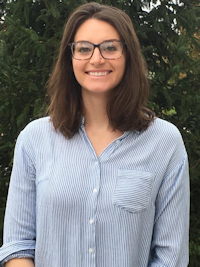
Dr. Andrea Dixon joined CORE in September. Andrea grew up in Sacramento, CA and received a BA with a double major in biology and history from the University of Central Missouri. She received her PhD at Washington State University, where she focused on population genetics and the evolutionary mechanisms constraining species range limits. She then went on to work as a post-doctoral researcher at Rothamsted Research, using next generation sequencing to investigate the population genetic structure of herbicide resistant black-grass, a winter-wheat crop weed, in the UK. She moved to Manhattan in July and joined CORE as a research associate in September 2018. Welcome Andrea!
Three faculty in the College of Veterinary Medicine officially joined CORE in 2018. Dr. Raghavendra Amachawadi’s research interests are in antimicrobial resistance in gut commensals and foodborne pathogens of swine and cattle production systems. Dr. Gregg Hanzlicek’s interests include designing and implementing bovine herd disease surveillance programs, bovine herd disease management, and production medicine record analysis. Dr. Ram Raghavan studies the frequency and distribution of vector-borne/zoonotic diseases over temporal and spatial scales.
Core Faculty and Students Engaged in National and International Conferences
CORE faculty and students participated in The 15th International Symposium of Veterinary Epidemiology and Economics (ISVEE) held November 12-16, 2018, in Chiang Mai, Thailand.
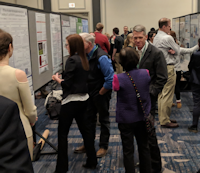
Dr. Joaquin Baruch, PhD student, received an ISVEE bursary award that included the symposium registration fee and accommodations while at the symposium. Hannah Seger and Dr. Aurelio Cabezas, PhD students, received travel awards from the College of Veterinary Medicine, Graduate Student Awards Committee. The ISVEE scientific committee accepted abstracts by Drs. Dustin Pendell (Professor, Department of Agricultural Economics) and David Renter, and graduate students, Dr. Aurelio Cabezas and Hannah Seger for oral presentations. In addition, five posters were presented by Drs. Joaquin Baruch, Ana Rute Oliveira and Natalia Cernicchiaro.
CORE was also well represented at The 99th Annual Conference of Research Workers in Animal Diseases (CRWAD) held December 1-4, 2018, in Chicago. Dr. Renter attended the USDA-NIFA Project Directors Meeting. CORE faculty, Drs. Chuck Dodd, David Renter, Mike Sanderson, and Victoriya Volkova, gave oral presentations. Dr. Tariku Beyene (post-doctoral fellow) gave two presentations and PhD students, Hannah Seger, Dr. Joaquin Baruch, Dr. Tara Gaire, Dr. Aurelio Cabezas and Diana Valencia each gave oral presentations. Diana Valencia also gave a poster presentation on her research, and received an award to assist with her travel expenses for the conference from the KSU Graduate Student Council. In addition, Dr. Nora Bello, on invitation from the Association of Veterinary Epidemiology and Preventive Veterinary Medicine (AVEPM), delivered a 2-day pre-conference short course on Applied Bayesian Modeling. The course was very well-received and attended (with over 30 registrants), and was co-sponsored by AVEPM and CORE
Awards and Recognition
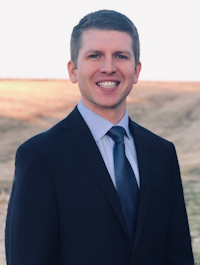
Dr. Charley Cull, former CORE graduate student, will be recognized at the 7thAnnual Distinguished Young Alumni Award program! The K-State Alumni Association and Student Alumni Board sponsor this program to honor outstanding accomplishments of young graduates of Kansas State University.
 Dr. David Renter was recently appointed to the Dr. Robert MacDonald Professorship for his professionalism, character, and achievements in the field of safe food production from livestock. The purpose of this professorship is to perpetuate the memory of Dr. MacDonald, a 1940 alumnus of the College of Veterinary Medicine at Kansas State University. As the recipient of this endowed professorship, Dr. Renter is charged to reflect the integrity, devotion, and humane consideration that was exemplified by Dr. MacDonald throughout his career.
Dr. David Renter was recently appointed to the Dr. Robert MacDonald Professorship for his professionalism, character, and achievements in the field of safe food production from livestock. The purpose of this professorship is to perpetuate the memory of Dr. MacDonald, a 1940 alumnus of the College of Veterinary Medicine at Kansas State University. As the recipient of this endowed professorship, Dr. Renter is charged to reflect the integrity, devotion, and humane consideration that was exemplified by Dr. MacDonald throughout his career.
Dr. Renter has been a faculty member in the College of Veterinary Medicine since 2005, and is currently a professor of veterinary epidemiology. He is also the founder and director of the Center for Outcomes Research and Epidemiology, an interdisciplinary hub for collaboration that uses quantitative approaches to enhance animal health for the benefit of animals and our society. During his career, he has been instrumental in developing major animal health and food safety programs that have engaged students, practitioners, industry leaders, government agencies, and faculty from multiple institutions. His work has addressed issues important to Kansas, the nation, and the world; his leadership in this domain has been recognized internationally. Upon learning of this appointment, Dr. Renter said: “I am privileged to have the opportunity to further benefit the health of animals while protecting public health through the promotion of food safety. The most rewarding part of my career is seeing my former students carrying this work forward into their own leadership roles and making positive impacts on the veterinary profession, animal science, and society as a whole.”
A historical context on Dr. MacDonald's life and the endowment.
Recent CORE Seminars
Dr. Audrey Ruple, University of Purdue
The Center for Outcomes Research and Epidemiology hosted Dr. Audrey Ruple from the University of Purdue. Dr. Ruple presented a seminar titled “Comparative medicine – dogs can talk if you know how to listen” on December 12, 2018.
Dr. Audrey Ruple is recognized nationally and internationally as a thought-leader in the field of “One Health,” the intersection of human, animal, and environmental health. Her diverse educational background and extensive experiences in companion animal epidemiology lend themselves to her research in both comparative/translational medicine and infectious diseases that occur at the human-animal interface. She obtained her DVM, MS, and PhD degrees from Colorado State University, is a Diplomate of the American College of Veterinary Preventive Medicine, and is a Member of the Royal College of Veterinary Surgeons. She is an advocate for equality both within and outside of the veterinary profession and serves as the Chair of the Equity and Diversity Committee for Purdue University.
Dr. Victor Del Rio Vilas, University of Surrey
The Center for Outcomes Research and Epidemiology (CORE) sponsored a seminar by Dr. Victor Del Rio Vilas “Operationalization of One Health in Eastern Africa: Organizational and Methodological Challenges” on October 23, 2018. Dr. Victor Del Rio Vilas (DVM, MBA, MSc (Epi), PhD) is at the Dept. of Epidemiology, School of Veterinary Medicine, University of Surrey (UK), and at the Centre on Global Health Security at Chatham House, London. Until January 2018, he worked at the World Health Organization (WHO) on the development of an epidemic vulnerability evaluation framework. Until November 2016, Dr. Del Rio was a consultant with the Pan American Health Organization (PAHO/WHO), based in Rio de Janeiro (Brazil) with regional responsibilities. In that capacity, Dr. Del Rio advised Ministries/Departments of Health across the region on epidemiology, surveillance and control measures for a number of diseases such as rabies, leishmaniasis, yellow fever and on zoonoses programmatic issues. He also contributed to WHO’s global response to the outbreak of Ebola Virus Disease in Liberia in 2015, previously worked in Uzbekistan implementing the Biological Threat Reduction Program (Defense Threat Reduction Agency, US DoD), and as veterinary advisor and epidemiologist for UK´s Department for Environment, Food and Rural Affairs (Defra) and the Veterinary Laboratories Agency, respectively.
Dr. Bruce Wagner, USDA Center for Epidemiology and Animal Health (CEAH)
CORE hosted Dr. Bruce Wagner, the Director of the USDA Center for Epidemiology and Animal Health (CEAH), March 27-28, 2018. Dr. Wagner presented a seminar “The Center for Epidemiology and Animal Health: Mission, Scientific Focus, Collaborative Opportunities.”
